#but bring up racism in the gay/lesbian community?
Text
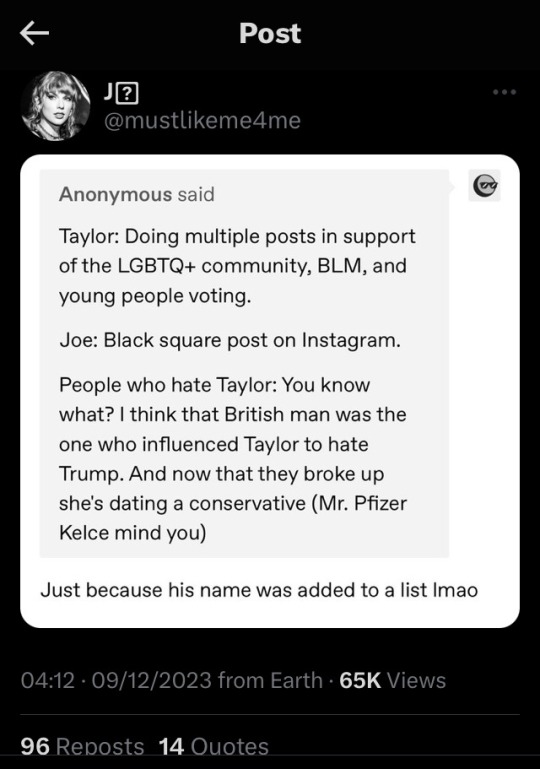
“multiple posts in support of the lgbtq community”
her LGBTQ “activism” pretty much started and ended with the lover era. she released the musical equivalent of “it’s ok to be gay,” she waited until she was in a blue state on the eras tour to even barely address the anti trans legislation that was being passed in OTHER states (states she had just performed in where her speech would’ve made much more of an impact). and telling people to go vote without specifying who you’re voting for or bringing attention to the important issues is not activism. it’s merely a voting reminder. which is fine, but, y’know, it doesn’t make you an lgbt advocate. which she promised to be as she accepted an award for it.
and despite the fact that she’s reportedly “spending a lot more time” in fuckass missouri to be with travis, she’s yet to say anything about the anti lgbt legislation being passed in that state.
she also went off tumblr because people asked her to talk about BLM and swifties act like it was the cruelest thing in the world to expect of her 🙄 but she made a whole thing in her documentary about wanting to be on the “right side of history.”
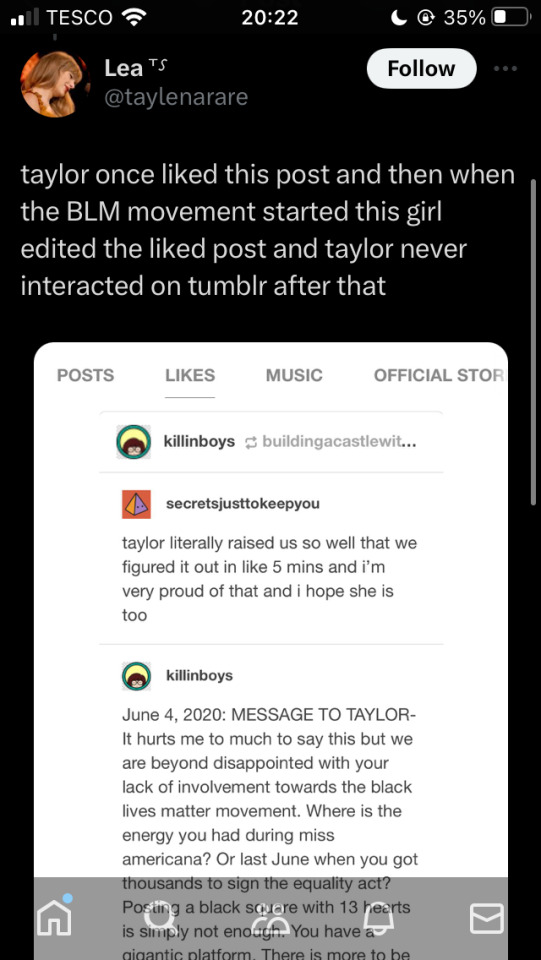
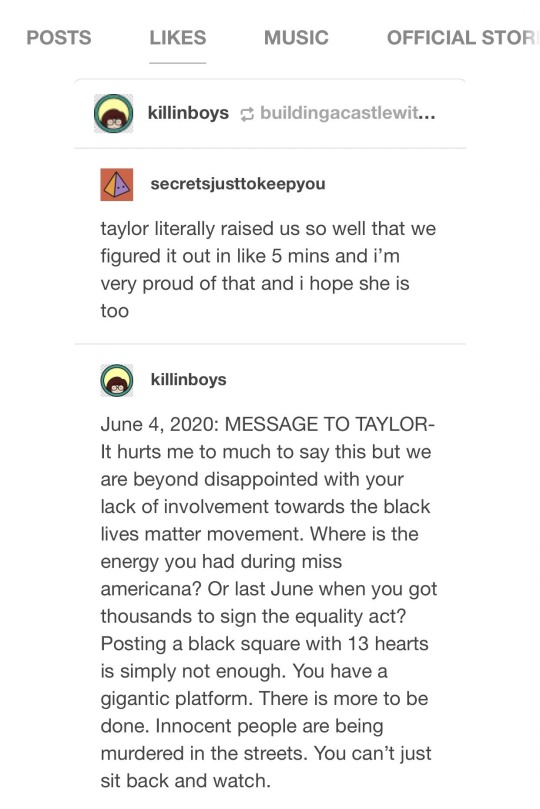
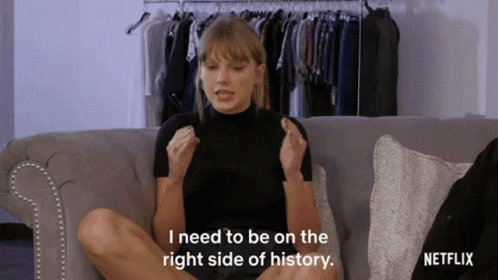
and taylor did the black square too so if you’re gonna attack joe for that 💀
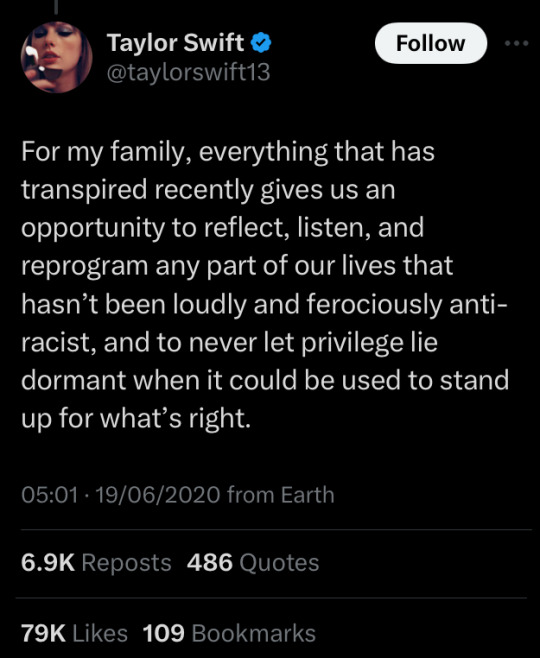
and she made some promises on twitter to be “loudly and ferociously anti-racist.” then she went on to date racist pos matty healy… and use ice spice as a shield. AND she also made sure that her publicist let everyone know that the “controversy” surrounding matty’s racism had NOTHING to do with her decision to split from him.
so… yeah.
these same miserable fucking swifties used to praise joe alwyn for speaking out against men abusing their power over women in hollywood but now their whole blogs are basically dedicated hate blogs to him. because he committed the crime of not marrying taylor so now they’ve decided he’s the worst man on the planet. 🙄
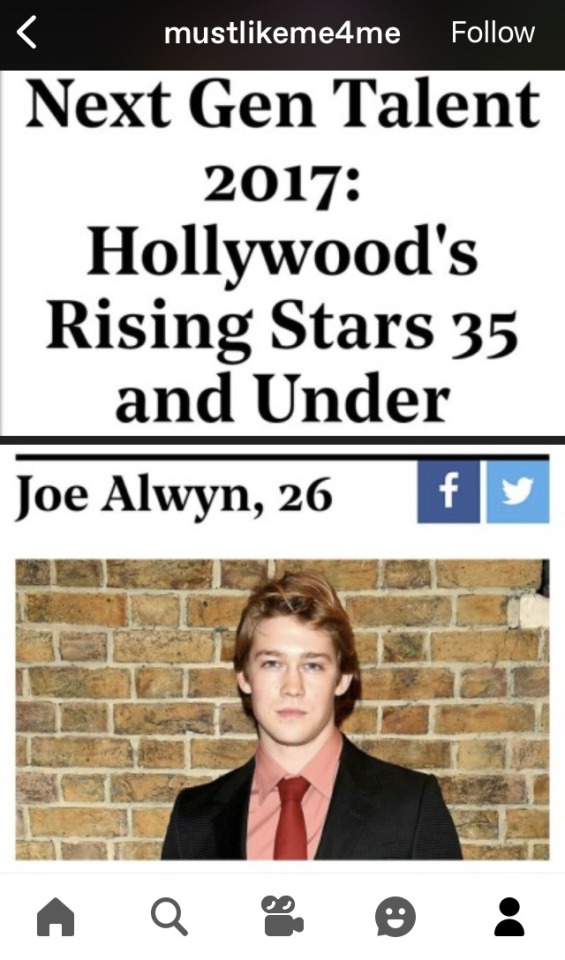
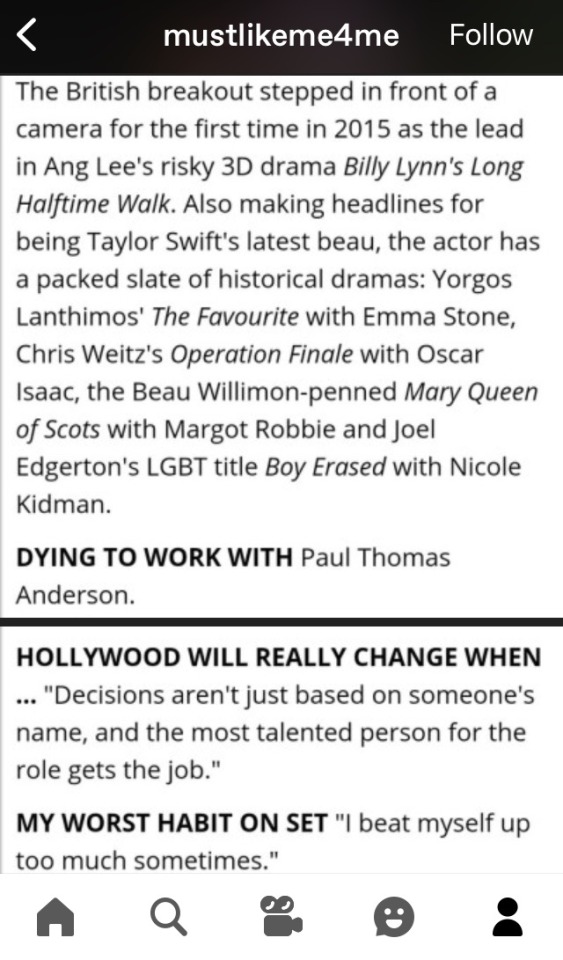
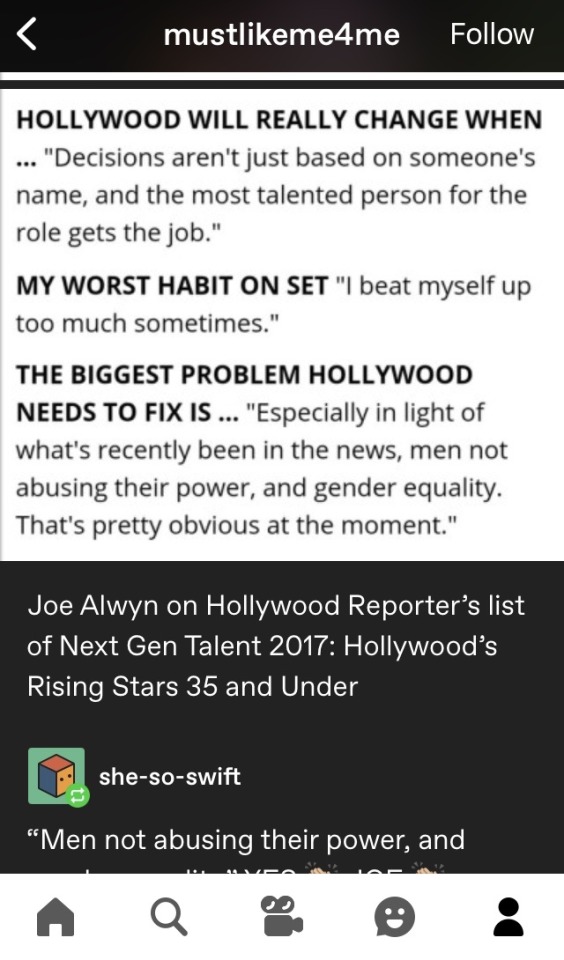
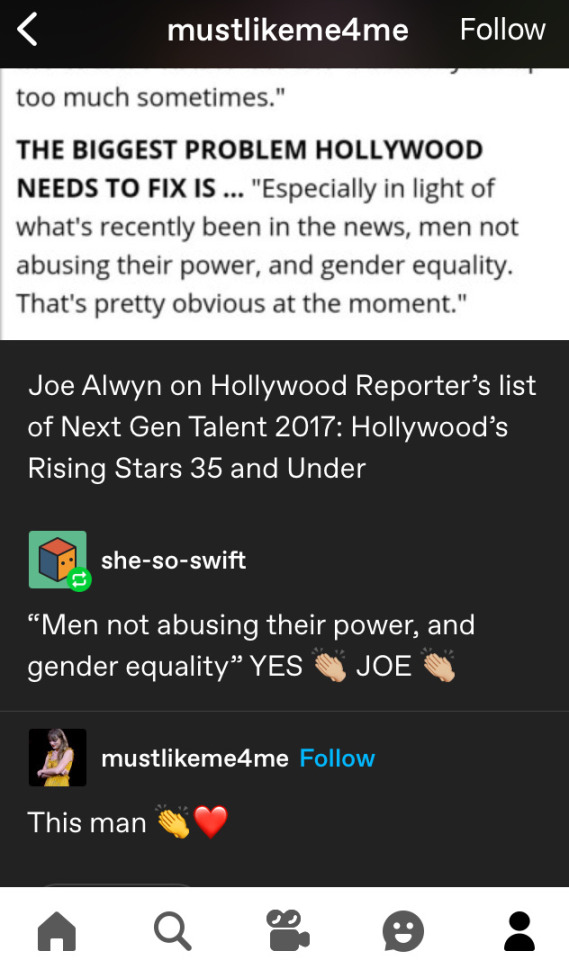
meanwhile taylor’s working with rapist directors, hanging out with SA apologists and high-fiving an abuser at football games. her feminism and “advocacy” is limited ONLY to herself and it’s painfully obvious she does not give a shit about anything that doesn’t directly affect her.
also, joe’s name wouldn’t have been added to that ceasefire letter if he didn’t WANT it added. it’s a risk to anyone in the entertainment industry to openly support palestine and no one’s name is going to be “just added” without their consent. signing that ceasefire letter may be bare minimum shit, but it’s still more than anything Miss Americana has said or done regarding this issue, which is absolutely nothing, and you have to ask yourself WHY.
also if you’re upset about people saying that taylor was encouraged to be more political because of joe… idk what to tell you that’s literally a canon event that came straight from taylor’s own mouth.
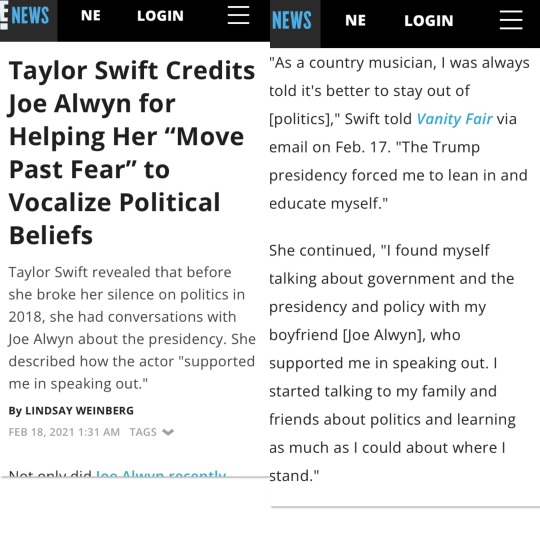
and it’s not that i think she’d be a trump supporter without joe but… it’s pretty obvious that since they’ve broken up (and even in the year leading up to the breakup) she’s not dared to do anything remotely resembling activism or being “controversial.” if anything she’s just too fucking narcissistic and self-absorbed to care about anything going on in the world, just like her bestie selena.
141 notes
·
View notes
Text
Statement
I wish to make a statement regarding what happened on the 14th of April, 2023
I, at first, wanted to move on from what happened and start again
But, seeing as some people aren't willing to let go of what happened, I feel I have no choice but to give my side of the story
I'll admit, I haven't been perfect in all this
I made mistakes
Many I wish I could take back, and would do if it was possible
But, whether I'm forgiven or not isn't up to me
That being said, however, the person who started all this in the first place isn't innocent either
I wish to address the accusations against me regarding, defending a transphobic person, racism, me fetishising trans men in my Perfectly Imperfect roadrat fanfic, and my conduct with minors, in that order
First, the accusations of me defending transphobic person
These accusations were first brought against me on the 14th of April, 2023, when user @sodapoptisms dug up a tweet from someone who said the following
Link
They then followed up with a quote tweet saying the following
Link
Now, I knew the person being screenshotted
I don't defend how they said what they said
Out of context, it's very poorly worded
What I DO defend is the fact that I took issue with Soda wanting the roadrat fandom to "band together and force the bigot out"
In other words, Soda wanted to rally a mob against this person for their political beliefs
I took issue for several reasons
The first one being like I said, I knew this person at the time
I knew they weren't anti trans rights
But forcing someone out for not agreeing with every aspect of the trans community can cause someone to become anti trans out of spite
Which brings me to my next point
I knew not speaking out against Soda could have a detrimental effect on the support for trans rights on the grassroots level
How?
Because this person had said they'd had many bad experiences with members of the trans community
Many people have sadly come out against the trans community for those reasons as well
Including many gays, lesbians, bisexuals, and even some transgender people
Clearly, bullying people for not holding your exact political views isn't working
And may actually be making things worse
That isn't to say that you win rights by coddling people's feelings
But you don't win people over by bullying and demonising them either
There is a balance that needs to be met, which isn't at the moment
You can't just demand people be your ally, then treat them like shit when they refuse, or don't live up to your standards
The second accusation I want to address is the one of racism
I was accused of this after writing an open letter to Soda shortly after what happened on the 14th of April, which no longer exists
But in it, I used the term Flying Monkeys to refer to the mob Soda had rallied against myselfand the other person
The term, Flying Monkeys, is commonly used as a nickname in pop psychology for the friends of narcissists
However, because Soda has many friends who are black, they twisted the words to accuse me of referring to them in a racially derogatory way
This was despite me pointing out the fact that I did not know Soda's friends were black, as even if they have that in their bios, I don't tend to read bios in detail, if at all. So, I was unaware unless I saw a photo of them
Thirdly, the fetishising of trans men in fanfiction
I never thought I'd have to bring this up
After all, no artist or writer should has to explain or justify why they made the choices they did in their works, but here we go.
Long story short, I tend to write stories with mpreg in it
You can think ill of me for it if you like, I don't care
But, I do not write these sorts of fanfiction for fetish fuel
I wrote Perfectly Imperfect for several reasons
The major one being that I have a lot of unresolved Daddy Issues
I won't get too much into my personal history, other than my father wasn't much in the picture when I was growing up
The few times he was in the picture, he was abusive
Not just to me, but to my mother, my sisters, & his previous two families, which he had left prior
I was estranged from him for eight years until I learned he had cancer, & I decided to reconnect with him two years before he died
I began writing Perfectly Imperfect a year prior to my father's death
Why use Mpreg to deal with Daddy Issues, you may ask?
The answer is twofold
I want to have my own family one day, & I tend to project that desire onto my favourite characters
I'm also fascinated with the father/child bond I guess
Particularly those that, while they may not be perfect, they at least are there for their child/ren, and don't abuse them
As for the fact that I've written Junkrat giving birth
That tends to be how a pregnancy concludes
But, I always focused on Junkrat himself, & what he's going through while giving birth
Such as his the pain he's in and how scared he is
How he looks to Roadhog for comfort
And how Roadhog helps him through it
It's about the emotion & vulnerability of the scene, in other words
Birth is messy, & can be gross, I can understand why many are squicked out by it
But it's a fact of life, much like death
Fourth, I'd like to discuss my supposedly inappropriate conduct with minors online
As many of you will know, I used to run Roadrat server. This server was an 18+ server, as I didn't feel I could, nor did I want the extra responsibility of, keeping minors safe within it
However, I would ask around to see if many people wanted to join, provided they were of age
As at the time, there was a content drought, & I wanted to keep the fandom as active as possible through it
Which I felt I could do through Discord
Unfortunately, not everyone has their age in their bios, which is fine
I understand not everyone feels safe showing people their age
But, it does sometimes mean I'm unsure, & have to ask about the person's age
This person there were a minor & then asked if they knew of any other Roadrat servers
I didn't really know of any that were as active as mine was a the time, so I made them an offer
They tell me when they come of age, & I'd let them into my server on the day
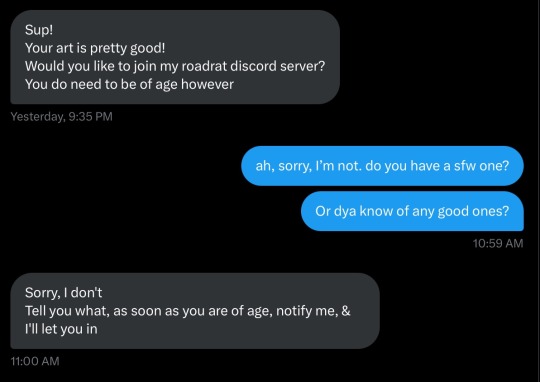
As you can see, nothing inappropriate took place, & the conversation pretty much ended after that
So, that is the context of everything that happened
Lastly, I want to address @sodapoptisms aka @sodapopblast directly
I'm sorry
I'm sorry I ever had the misfortune of knowing you and your friends
I'm sorry I ever thought of you as someone worth my time
I'm sorry I never saw how much you use your gender identity as a sheild to bully and harass people who step out of line
I'm sorry I never saw how much of a manipulative and cowardly bully you are
And I pity your friends who don't see you for the worm you truly are
It's because of you that I've had to endure being mischaracterised and demonised by your false & deliberately misleading accusations
For months
I've endured multiple accounts of abuse, and many death threats because of you
I lost my standing in the Overwatch community
All of this took a major toll on my mental health & general well-being
It not only affected my ability to perform my job as a care worker, which I was so scared I'd lose because of you
But also my self-confidence & and self-esteem, which I had painstakingly built up by writing my Roadrat series over five years
Only for you to tear it down in the span of one day
I used to hold such ill-will towards you for a long time
But that's only stooping to your level
You deserve to get better as much as I do
But the sad thing is, you probably won't
You're way too comfortable where you are right now, surrounded by your fandoms & your Yes Men
I doubt you'll find true happiness while you're where you're at
And that's enough for me
54 notes
·
View notes
Text
Since I'm in the Helluva Boss Mood, I'm going to talk about something that I hope doesn't get me crucified.
I.ABSOLUTELY. HATE. THE .STOLYTZ.
Although I only realized this year.
If we go for the bases, we go with the bases.
✨NEITHER OF THE TWO KNOWS THE BASICS OF A STABLE RELATIONSHIP✨
Stolas was put in an arranged marriage as a child, having an EXTREMELY absent father and living in a turbulent relationship (which became abusive at times, with quiet moments but well, I don't think it would last long) with Stella. We are not told that Stolas has tried to be unfaithful in the past, so Stolas has no REAL EXPERIENCE in HEALTHY relationships to enter into one.
Blitz is much worse in this regard. He had an alcoholic father who left him in the background ALL the time above his best friend, and having to take care of his mother. He accidentally causes an accident that ends up killing his mother, leaves his best friend disabled, his sister hates him, etc.
Blitz, unlike Stolas, did have more relationships before him, but we know that they all ended BAD, especially VEROSIKA (there are even hints that she wanted to help him with his bad situation but he pushed her away) and as such it only did more harm than good .
all this without counting episode 1/season 2
Stolas clung TOO much to the good memory he had of Blitz, but to him it didn't mean HALF of what it meant to Stolas (since he already had positive things in his life like his sister, his mother and Fizz) so what? What does an adult with zero knowledge of healthy affection and ZERO experience in real relationships do? HE MANIPULATES TO GET WHAT HE WANTS.
Which brings me to my second point.
✨THE IMBALANCE OF POWER✨
If we ignore the fact that Imps are considered the lowest race in hell (because like all forms of racism, it is STUPID reasoning) even so the biggest red flag is the huge imbalance of decision-making power that exists in the relationship.
Blitz only wanted Stolas' book, HE REALIZED and what did he do? HE MADE A SEXUAL "ARRANGEMENT"(ABUSE, BC THE SEX CAN'T NEVER EVER BE A COIN TO TREAT WITH)WITH BLITZ TO GIVE HIM HIS BOOK (which HE KNEW HE NEEDED) ALL IN ORDER TO GET CLOSE TO HIM.
This is a monumental ABUSE OF POWER by Stolas! because at the end of the day he is the one who decides whether he gets the book or not (he knows it is VITAL for his work, WHAT HE LIVES ON) AND he tries to excuse it with the fact that it is a "way to spend time with him" EXCUSE ME !?!?
First of all, how the hell was Blitz supposed to realize that Stolas "loved" him if in episode one they literally had to censor everything that Stolas wanted to do in bed with Blitz? (and it's like that until chapter 6-7 where he begins to act more affectionately)
THERE ARE A THOUSAND WAYS TO INVITE SOMEONE OUT AND YOU HAD TO CHOOSE THE MOST ASSHOLE AND TOXIC ONE OF ALL. Abuse of power, control, poor communication, THERE'S EVERYTHING HERE, I'M IN CHERNOBYL!
AND IT'S NOT EVEN THE WORST.
Just because! There are toxic relationships that are fine to show on screen, especially in this case, gay/lesbian couples are rarely put under a toxic air, so there was A LOT to take away.
but the WORST thing is how ROMANTICIZED IT IS and as if BY FORCE they want you to 1) feel sorry for Stolas/get angry with Blitz or 2) that you SHIP THEM...
WHAT
Look, I like both characters, their stories are interesting and I like their personalities. the episodes focusing on JUST ONE of them are very good, but that's the point.
✨THE QUALITY DECLINES EVERY TIME THEY ARE TOGETHER ✨
Stolas is much more likable when he's being the prince of hell who's going through a turbulent divorce, dealing with his teenage daughter who he adores, singing songs to said daughter, helping other Demon Lords (I'm looking at you Asmodeus), etc.
Blitz seems much happier being with Millie and Moxxie killing people, talking about Loona, doing his job, getting into trouble with humans and being a complete bloodthirsty.
BOTH SHINE BRIGHTER BEING SEPARATED, NOT TOGETHER.
If you ignore the whole romance thing, they are good characters, but they forcefully want to introduce this drama...
ahg....it's late, I have school tomorrow, don't kill me for my honest opinion. If I think of anything else I'll edit it.
love ya❤️❤️❤️❤️
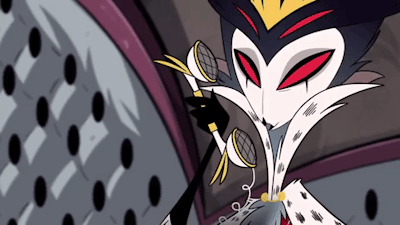
#helluva boss#helluva blitzo#helluva boss stolas#helluva boss critical#helluva boss criticism#i bloody LOVE helluva boss but i see their flass really clearly now...#anti stolitz
80 notes
·
View notes
Note
This isn't just a st fandom problem, it stretches across fandom as a whole.
But I think people focus on and constantly bring up Steve's 'sins'/ asshole behaviour while ignoring everyone else's because fandom seems to consider homophobia the 'worst' kind of bigotry. They can ignore racism, sexism, ableism, but they can't excuse homophobia. They only care about any other type of bigotry if they can use it to prove a point.
They bring up Steve being homophobic for using 'queer' against Jonathan in season 1 but they ignore
The kid's, particularly Dustin and Lucas, casual ableism in s1, when they kept referring to El as 'the psycho' and talking about her escaping from Pennhurst, calling it a 'nuthouse', constantly referring to her as the weirdo or the freak
Jonathan's ableism in s2 when he refers to the kids as Will's 'spazzy friends'
Billy's misogyny, referring to the girls of Hawkins High as cows.
Billy's racism. Everything about the way he treated Lucas. Just because the actor refused to say the N word, doesn't make the character not racist. There is more to racism than just using slurs.
Jonathan's casual misogyny, the way he talks to and treats Nancy at times, especially in s1 when they're talking about the photos. And the way he talks to and treats Joyce at times.
These are just some of the examples I can think of just from the top of my head. But they all get ignored or swept under the carpet, because 'not that big of a deal.'
All bigotry is bad. But Steve is the only character that has shown a hint of bigotry and then been shown to move past it. To make amends and show that he is now accepting of it. No matter how much people try to claim that Steve accepting Robin as a lesbian isn't proof of him no longer being homophobic. As if lesbians are somehow less gay than gay men.
i think because the majority of the fandom is gay, they just… don’t really give a fuck about other forms of bigotry.
they really think that homophobia is the worst that it gets. and that homophobia really only seems to apply to gay men, because the way they treat bisexuals and lesbians is…. jarring. to say the least.
obviously the show is set in the 80s, so it’s not like the bigotry is… totally unexpected or out of place. but i don’t think it’s treated or written right within the show, and i think that’s one of the factors that makes people so comfortable with ignoring it.
steve’s homophobia is unambiguously portrayed as the wrong thing. as steve’s lowest point. the actions he has to claw his way back from. but the bigotry within other aspects of the show is just… ignored. it’s just a joke. or not that serious. the characters aren’t punished or proved wrong. (i do kinda think that’s because a lot of bigotry was inadvertent, and more reflective of the duffers as people rather than because they were trying to accurately portray an 80s society. but whatever).
steve’s homophobia being treated as the biggest bad is also kinda weird to me because it doesn’t really have… a ‘real’ target, so to speak. like, the parties ableism is directed towards el, who, while she doesn’t have a canonical disability, is developmentally behind and raised in a lab. jonathan’s misogyny is directed at nancy and joyce, his ableism is directed towards the party, and therefore dustin. billy’s racism is directed towards lucas and his misogyny is spoken to max.
whereas steve (I AM NOT CONDONING HIS ACTIONS THEY ARE WRONG!!!) calls jonathan a queer. who is not a gay man. while it’s still obviously wrong and homophobic, the target of his homophobia is not a member of the community. and yet, people treat his comment as if it’s the worst form of bigotry on the show.
they’re willing to overlook everything else. they’re willing to perpetuate lesbophobia and biphobia, racism and misogyny. they’re willing to write thousands of outing fics where the outing isn’t portrayed as wrong. but steve saying the word queer? unforgivable.
(honestly, though steve’s homophobia is the only form of bigotry that we see treated as wrong and we see a demonstration of steve’s growth later in the seasons. i don’t know if we can even give the duffers that, because robin wasn’t originally going to be a lesbian. which means the duffers were never planning on dealing with any of the bigotry in the show in a meaningful matter. but that’s a different conversation)
#i responding to this and then it deleted the whole thing and man it was painful rewriting it lmak#i’m not rewriting that lmao#steve harrington#stranger things#asks#anon
21 notes
·
View notes
Text

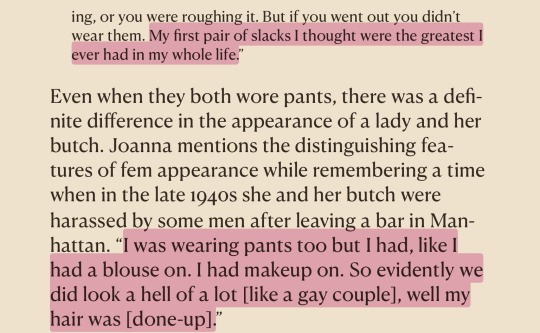

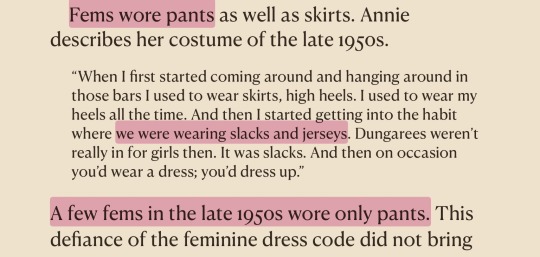
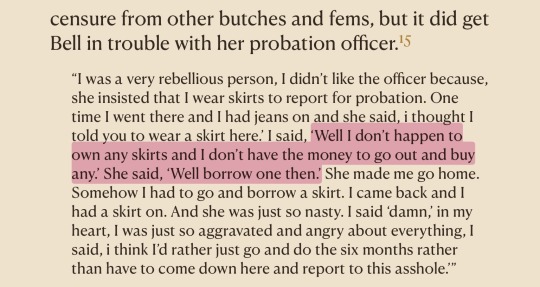
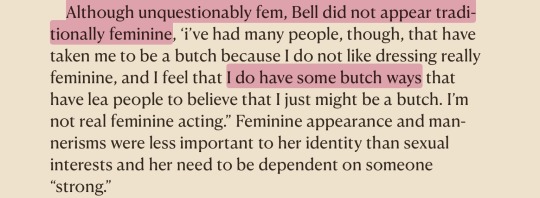
“Fems wore pants”: gender non-conforming fems of the 1940s & 50s
note: most of the narrators quoted in these sections are white; Marla, mentioned in excerpt 3, is a Black woman who did not strongly identify with roles when interviewed in the 80s and was a fem in the 1950s. Sandy and other white butches perceiving Marla as more masculine than she identifies, while an issue also experienced by white narrators, is likely influenced by racism / misogynoir.
image description: six screenshots of text from the book Boots of Leather, Slippers of Gold: The History of a Lesbian Community by Elizabeth Lapovsky Kennedy & Madeline D. Davis (1994).
excerpts 1 & 2:
[…] even wore pants. Joanna remembers how much she liked her first pair.
“At that time slacks weren’t really that popular.… And to wear a pair of slacks was really kind of looked down on because they just weren’t worn for everyday attire. That wasn’t part of the wardrobe. That was part of somehow, say you were going riding, or you were roughing it. But if you went out you didn’t wear them. My first pair of slacks I thought were the greatest I ever had in my whole life.”
Even when they both wore pants, there was a definite difference in the appearance of a lady and her butch. Joanna mentions the distinguishing features of fem appearance while remembering a time when in the late 1940s she and her butch were harassed by some men after leaving a bar in Manhattan. “I was wearing pants too but I had, like I had a blouse on. I had makeup on. So evidently we did look a hell of a lot [like a gay couple], well my hair was [done-up].”
excerpt 3:
Although Sandy assumed that Marla was butch due to her short, curly hair and her athletic demeanor, Marla identifies herself as more fem in later interviews.
excerpts 4 & 5:
Fems wore pants as well as skirts. Annie describes her costume of the late 1950s.
“When I first started coming around and hanging around in those bars I used to wear skirts, high heels. I used to wear my heels all the time. And then I started getting into the habit where we were wearing slacks and jerseys. Dungarees weren’t really in for girls then. It was slacks. And then on occasion you’d wear a dress; you’d dress up.”
A few fems in the late 1950s wore only pants. This defiance of the feminine dress code did not bring censure from other butches and fems, but it did get Bell in trouble with her probation officer.
“I was a very rebellious person, I didn’t like the officer because, she insisted that I wear skirts to report for probation. One time I went there and I had jeans on and she said, ‘I thought I told you to wear a skirt here.’ I said, ‘Well I don’t happen to own any skirts and I don’t have the money to go out and buy any.’ She said, ‘Well borrow one then.’ She made me go home. Somehow I had to go and borrow a skirt. I came back and I had a skirt on. And she was just so nasty. I said ‘damn,’ in my heart, I was just so aggravated and angry about everything, I said, ‘I think I’d rather just go and do the six months rather than have to come down here and report to this asshole.’”
excerpt 6:
Although unquestionably fem, Bell did not appear traditionally feminine, ‘i’ve had many people, though, that have taken me to be a butch because I do not like dressing really feminine, and I feel that I do have some butch ways that have lea people to believe that I just might be a butch. I’m not real feminine acting.” Feminine appearance and mannerisms were less important to her identity than sexual interests and her need to be dependent on someone “strong.”
end image description.
#fem#femme#gnc#queer history#1940s#1950s#quotes#image described#homophobia#harassment#racism#misogynoir#misogyny#mac’s bookshelf#boots of leather slippers of gold#everything goes back to femme
11 notes
·
View notes
Text
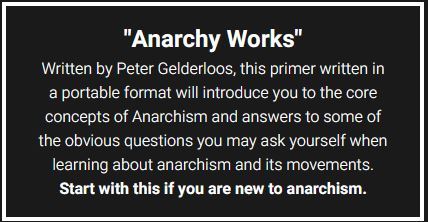
Chapter 1. Human Nature
Haven’t humans always been patriarchal?
One of the most ancient forms of oppression and hierarchy is patriarchy: the division of humans into two rigid gender roles and the domination of men over women. But patriarchy is not natural or universal. Many societies have had more than two gender categories, and have allowed their members to change gender. Some even created respected spiritual roles for those who did not fit into either of the primary genders. The majority of prehistoric art depicts people who are either of no determinate gender or people with ambiguous, exaggerated combinations of masculine and feminine traits. In such societies, gender was fluid. It was something of a historic coup to enforce the notion of two fixed, idealized genders that we now consider natural. Speaking in strictly physical terms, many perfectly healthy people are born intersexed, with male and female physiological characteristics, showing that these categories exist on a fluid continuum. It makes no sense to make people who do not fit easily into one category feel as though they are unnatural.
Even in our patriarchal society, in which everyone is conditioned to believe that patriarchy is natural, there has always been resistance. Much current resistance by queer people and transgender people takes a horizontal form. One organization in New York City, called FIERCE!, includes a wide spectrum of people excluded and oppressed by patriarchy: transgender, lesbian, gay, bisexual, two-spirit (an honored category in many Native American societies for people who are not identified as strictly men or women), queer, and questioning (people who have not made up their minds about their sexuality or gender identity, or who do not feel comfortable in any category). FIERCE! was founded in 2000, mostly by youth of color, and with anarchist participation. They uphold a horizontal ethic of “organizing by us, for us,” and they actively link resistance to patriarchy, transphobia, and homophobia with resistance to capitalism and racism. Their actions have included protesting police brutality against transgender and queer youth; education through documentary films, zines, and the internet; and organizing for fair healthcare and against gentrification, particularly where the latter threatens to destroy important cultural and social spaces for queer youth.
At the time of this writing they are particularly active in a campaign to stop the gentrification of the Christopher Street Pier, which has been one of the only safe public spaces for homeless and low-income queer youth of color to meet and build community. Since 2001, the city has been trying to develop the Pier, and police harassment and arrests have multiplied. The FIERCE! campaign has helped provide a rallying point for those who want to save the space, and changed the public debate so that other voices are heard besides those of the government and business owners. Our society’s attitudes about gender and sexuality have changed radically in the past centuries, largely because of groups like this taking direct action to create what is said to be impossible.
Resistance to patriarchy goes back as far as we care to look. In the “good old days” when these gender roles were supposedly unchallenged and accepted as natural, we can find stories of utopia, that upset the assumption that patriarchy is natural, and the notion that civilized progress is bringing us steadily from our brutal origins towards more enlightened sensibilities. In fact the idea of total freedom has always played a role in human history.
In the 1600s, Europeans were streaming to North America for a variety of reasons, building new colonies that exhibited a wide range of characteristics. They included plantation economies based on slave labor, penal colonies, trading networks that sought to compel the indigenous inhabitants to produce large quantities of animal skins, and fundamentalist religious utopias based on the total genocide of the native population. But just as the plantation colonies had their slave rebellions, the religious colonies had their heretics. One noteworthy heretic was Anne Hutchinson. An anabaptist who came to New England to escape religious persecution in the old world, she began to hold women’s meetings in her house, discussion groups based on free interpretation of the Bible. As the popularity of these meetings spread, men began to participate as well. Anne won popular support for her well argued ideas, which opposed the slavery of Africans and Native Americans, criticized the church, and insisted that being born a woman was a blessing and not a curse.
The religious leaders of the Massachusetts Bay Colony put her on trial for blasphemy, but at trial she stood by her ideas. She was heckled and called an instrument of the devil, and one minister said, “You have stepped out of your place, you have rather been a husband than a wife, a preacher than a hearer, and a magistrate than a subject.” Upon her expulsion Anne Hutchinson organized a group, in 1637, to form a settlement named Pocasset. They intentionally settled near to where Roger Williams, a progressive theologian, had founded Providence Plantations, a settlement based on the idea of total equality and freedom of conscience for all inhabitants, and friendly relations with the indigenous neighbors. These settlements were to become, respectively, Portsmouth and Providence, Rhode Island. Early on they joined to form the Rhode Island Colony. Both settlements allegedly maintained friendly relations with the neighboring indigenous nation, the Narragansett; Roger Williams’ settlement was gifted the land they built on, whereas Hutchinson’s group negotiated an exchange to buy land.
Initially, Pocasset was organized through elected councils and the people refused to have a governor. The settlement recognized equality between the sexes and trial by jury; abolished capital punishment, witchtrials, imprisonment for debt, and slavery; and granted total religious freedom. The second synagogue in North America was built in the Rhode Island colony. In 1651 one member of Hutchinson’s group seized power and got the government of England to bestow him governorship over the colony, but after two years the other people in the settlement kicked him out in a mini-revolution. After this incident, Anne Hutchinson realized that her religious beliefs opposed “magistracy,” or governmental authority, and in her later years she was said to have developed a political-religious philosophy very similar to individualist anarchism. One might say that Hutchinson and her colleagues were ahead of their times, but in every period of history there have been stories of people creating utopias, women asserting their equality, laypeople negating the religious leaders’ monopoly on truth.
Outside of Western civilization we can find many examples of non-patriarchal societies. Some stateless societies intentionally preserve gender fluidity, like the Mbuti described previously. Many societies accept fixed genders and division of roles between men and women, but seek to preserve equality between these roles. Several of these societies allow transgender expressions — individuals changing their gender or adopting a unique gender identity. In hunter-gatherer societies “a sharp and hard division of labor between the sexes is not universal... [and in the case of one particular society] virtually every subsistence activity can be, and often is, performed by either men or women”.[7]
The Igbo of western Africa had separate spheres of activity for men and women. Women were responsible for certain economic tasks and men for others, and each group held power autonomously over their sphere. These spheres designated who produced which goods, domesticated which animals, and took which responsibilities in the garden and market. If a man interfered in the women’s sphere of activity or abused his wife, the women had a ritual of collective solidarity that preserved the balance and punished the offender, called “sitting on a man.” All the women would assemble outside the man’s house, yelling at him and insulting him in order to cause him shame. If he did not come out to apologize the mob of women might destroy the fence around his house and his outlying storage buildings. If his offense were grievous enough, the women might even storm into his house, drag him out, and beat him up. When the British colonized the Igbo, they recognized men’s institutions and economic roles, but ignored or were blind to the corresponding women’s sphere of social life. When Igbo women responded to British indecency with the traditional practice of “sitting on a man,” the British, possibly mistaking it for a women’s insurrection, opened fire, putting an end to the gender-balancing ritual and cementing the institution of patriarchy in the society they had colonized.[8]
The Haudennosaunne, called the Iroquois by Europeans, are a matrilineal egalitarian society of eastern North America. They traditionally use several means to balance gender relations. Whereas European civilization utilizes gender division to socialize people into rigid roles and to oppress women, queer, and transgendered people, the gendered division of labor and social roles among the Haudennosaunne functions to preserve a balance, assigning each group autonomous niches and powers, and allowing a greater degree of movement between genders than is considered possible in Western society. For hundreds of years the Haudennosaunne have coordinated between multiple nations using a federative structure, and at each level of organization there were women’s councils and men’s councils. At what might be called the national level, which concerned itself with matters of war and peace, the men’s council made the decisions, though the women held a veto power. At the local level, women held more influence. The basic socio-economic unit, the longhouse, was considered to belong to the women, and men had no council at this level. When a man married a woman, he moved into her house. Any man who did not behave could ultimately be kicked out of the longhouse by the women.
Western society typically sees the “higher” levels of organization as being more important and powerful — even the language we use reflects this; but because the Haudennosaunne were egalitarian and decentralized, the lower or local levels of organization where the women had more influence were more important to daily life. In fact when there was no feud between the different nations the highest council might go a long time without meeting at all. However, their’s was not a “matriarchal” society: men were not exploited or devalued the way women are in patriarchal societies. Rather, each group had a measure of autonomy and means for preserving a balance. Despite centuries of colonization by a patriarchal culture, many groups of Haudennosaunne retain their traditional gender relations and still stand out in sharp contrast to the gender-oppressive culture of Canada and the United States.
#anarchism#daily posts#communism#anti capitalist#anti capitalism#late stage capitalism#anarchy#anarchists#libraries#leftism#anarchy works#the patriarchy#feminism#sexism
4 notes
·
View notes
Text
Sexism is genuinely fascinating in how uniquely reversible it is.
Yes, broadly speaking, under a patriarchal system, when all other things are equal, women get the shorter end of the stick. We know this. This shouldn't be controversial or disputable. A white man will be treated by society as Better than a white woman. A man of color will be treated as higher on the hierarchy than a woman of the same race and ethnicity. Between a man and a woman with the same disability, making the same complaints, the man is likely to be taken more seriously - partially because, thanks to "man up" standards, one might assume (correctly or otherwise) that he waited longer to complain, because that often IS the case, but mostly because sexism says that women just love to complain for no reason all the time.
But when all other things are NOT equal?
What if you have an abled woman and a disabled man? Well, then it's a complete toss-up as to which factor "wins" - maybe the misogyny wins, because, psh, come on, women are SUPPOSED to serve men, quit complaining and hop to it, he NEEDS you to completely give up your entire life to bring him things on demand, how ableist can you be to say that maybe he should have a support system that's more than just you if he needs more than one person can reasonably provide, or maybe even actually do the physical therapy his doctor recommended so he can get back to being able to do something for himself once in a while, as his condition SHOULD allow? Other times, the ableism will win out - and when it does, it has its own sexist bent to it. He needs to Man Up and stop whining all the time. He's failing the million dollars test because his lung disease turned rhinovirus or RSV into pneumonia? Oh, waaah, waaah, cry harder about your Man Cold. It often uses feminism as an excuse - no, he's not asking for his actual disability-related needs to be accommodated, he's just being an entitled dude who thinks women exist to bend over backwards for him, because that's ALL men do, right?
This is why we see so much bullshit infighting in queer spaces over Who Has It Worse based on gender, when ultimately, when you stop trying to play the oppression olympics, what we have here is an illustration of how thoroughly arbitrary it is. Gay men are treated as more of a threat, because a huge aspect of homophobia is straight men being afraid gay men will treat them the way they treat women - but lesbians are treated as thieves, yanking away something straight men are entitled to. Why does it matter which is "worse" when it gets both groups killed, with significant frequency? Queer spaces have a problem with treating women as a lesser "support class" to men, and it's worth addressing, but not at the cost of downplaying how queer masculinity and maleness is, in fact, treated as some kind of horrible threat, and that constitutes a major chunk of the grounds on which queer people are oppressed. Never mind when trans people come into the picture - society doesn't know what to do with us! Regardless of what direction we're transitioning in, society just treats us as whichever binary gender is more convenient to demonize us at any given moment! In fact, so do exclusionists within the community! And as it turns out - sometimes, it's more convenient to demonize us as men.
But the real proof of where all of this comes from, the most reliable place for the dynamic to be reversed, is when it can be invoked for racism. Show me a white woman butting heads with a man of color, and - while I must disclaim that this is not a 100% hard and fast rule, I might be surprised, because extrapolating society-wide dynamics to EVERY individual interaction is part of how you end up with terf logic - I will almost certainly expect her to pull something in line with a power structure that oppresses him on gendered lines. This is what Karenism was about, before the internet bastardized it into being just a generic name you call any woman who stands up for herself - a Karen is someone who will, simultaneously, pull a "don't you know who I am!?" and "how dare you, you horrible brute, trying to take advantage of a poor defenseless woman like this!?".
A Karen is the kind of person who will call the cops on a Black or brown man minding his own business and say he threatened her.
Note that yes, she will absolutely do this kind of thing to a Black or brown woman, but the dynamic will often be different. I do not mean to erase that. But for the purpose of this post - discussing specific dynamics that reverse the typical "men are higher on the ladder than women" rule - we're specifically examining what happens when, say, a white woman claims a Black man whistled or "leered" at her. What happens then? Maybe he gets shot by the cops. Maybe he gets lynched - sure, that happens less often than it used to now, but anything is only illegal if you get caught. Maybe his life just gets ruined by a whisper campaign. Maybe nothing happens to him, but her story is used to continue the idea that Black and brown men are "bad hombres" who need to be chased out of this country or at least heavily policed to keep them in line. Regardless, there is a very strongly gendered aspect to this - accusations of sexual violence are believed without a second thought when it's a white woman making them against a Black or brown man, and this has a massive body count. We know that false accusations of sexual assault are very few and far between compared to unreported sexual assaults - but we often fail to acknowledge just how many of those false accusations are made up for racist reasons.
Not only that, but I must also briefly call out that I've seen white girls on this very supposedly progressive website claiming that Asian men are "basically women", when they're not calling out all men of Japan for being violent repressive pedophilic perverts.
That's because ultimately, the patriarchal standards that we have are a tool of white supremacy. That's it. That's all there is to it. What they mean and who they apply to can be twisted around at a moment's notice to uphold some other aspect of the system. The "natural strength" that it superficially insists that men innately have can be twisted to become a threat, if it threatens the rest of the system. The supposed "inherent weakness" of women can be twisted around to become a cudgel - upholding the dominance of the Great Male Head of the Household is, under this system, nearly the only thing that wins out over "protecting white women".
It's all white supremacy all the way down.
12 notes
·
View notes
Text
By: Monica Harris
Published: May 21, 2023
Recently, I was reminded of just how easy it is to be silenced in America now.
Two few weeks ago I published an article on Medium (linked here on my blog) about the impact of transgender inclusion on the rights of women and lesbians. I felt it was a timely and topical subject, and as a gay woman of color I obviously have a vested interest in this issue.
So, you can imagine my shock when, less than 24 hours after the article appeared, Medium’s Trust & Safety team removed it for violating community rules. I was further warned that repeated violations would lead to possible suspension of my account. My crime? Posting “hateful content.” (before continuing, I would encourage you to read the article yourself).

For perspective, I have more than 1,000 followers on Medium and have published nearly 70 articles on this platform. I’m a Harvard educated lawyer and am on the Board of Advisors of the Foundation Against Intolerance and Racism. I’m also a published author and a TEDx speaker. In fact, much of my writing focuses on bringing people together around our shared values and interests. In my entire career, I’ve never been accused of using hate speech or advocating hateful positions. Yet now I was being silenced for expressing my legitimate concerns about an issue that affects me and others in my community.
This incident is laced with many ironies, not the least of which is that I’ve spent much of my life feeling invisible and not having a voice. Growing up black and gay in the 70s and 80s was an alienating and often heartbreaking experience. Thankfully, as America has been forced to reckon with its insidious legacy of racism, sexism, and homophobia, the landscape has changed. Barriers have crumbled and hearts and minds have opened. I now enjoy a thriving legal career in the entertainment industry. I have a white partner and a biracial son. We happily live our alternative lifestyle in a red state that is overwhelmingly white and Christian. The past two decades have empowered me and helped me find my voice.
But now I fear that I’m in danger of losing my voice again. I worry that I and millions of other women are becoming invisible — not at the hands of right-wing extremists, but by people who promote tolerance, inclusion, and equity.
Medium’s content curators purportedly removed my article because it “disempower[ed]” and excluded others based on “protected characteristics,” i.e. biological men who identify as women. Yet they had no qualms about disempowering and excluding me — a member of not one, but three “protected” groups — from their online community.
Further, I was silenced for expressing my belief that inclusion of biological men in women’s sports and prisons, and other historically protected spaces potentially undermines the rights and safety of biological women and lesbians. Yet the act of deplatforming my article was, itself, proof of the marginalization I lamented in my article.
When I shared the incident with a left-leaning friend, she cautioned that conservatives, Nazis and right-wing extremists have created a dangerous environment for transgender Americans. While this is undoubtedly true of some fringe elements on the Right, I’m neither a Nazi nor an extremist. Why should my legitimate concerns be conflated with fringe elements with whom I have nothing in common? If an article that raises thoughtful questions and concerns on behalf of other protected groups can be characterized as “hateful content,” then what is the threshold for hate?
You don’t have to be gay, female, or a person of color to appreciate the danger this poses to all Americans. If the boundaries of prohibited speech keep growing, then we can effectively be silenced by anyone who disagrees with us or is offended by our opinions. All they have to do is call us “hateful.” But if we live in constant fear of offending others, then how long will it be before we’re too afraid to say anything?
Freedom of speech is one of our most cherished rights. While designed to protect us from censorship by our government, it’s indelibly woven into the fabric of American society. The free and open marketplace of ideas is what makes our country unique. It’s enabled groundbreaking innovation and thought and empowered historically disenfranchised groups.
Given my unique background and experience, freedom of speech holds a special place in my heart. After all, where would I be today if voices that made others uncomfortable had been muffled? Moreover, what will the future hold for all Americans if we continue on this path? Without unfettered freedom of speech, attempts to foster inclusion become illusory and performative.
Protecting this sacred right is neither easy nor painless; it demands our constant effort, vigilance, and above all, our selflessness. What we safeguard for ourselves we must also be willing to safeguard for others, even those with whom we vehemently disagree.
Unfortunately, Medium and a growing number of platforms and legacy media outlets aren’t willing to do the hard work. They’ve decided that freedom of speech should be sacrificed if it makes others uncomfortable — even if the people expressing themselves have lived in discomfort most of their lives, and in many cases still do. They’ve elected to trade one of our most fundamental rights for tolerance that’s often selective.
These well-intentioned guardians of “safety” fail to see that true tolerance must be expressed not just by our words, but also by our deeds. The noble goals of inclusion and equity become meaningless if we arbitrarily sacrifice these principles when it suits us or those with preferred agendas. Selective tolerance isn’t progressive; it’s regressive.
True tolerance also requires that we be on the same page about the rules of free speech. We’re entering an era of increasing social conflict, but we can’t navigate this challenging landscape and resolve our differences if the boundaries of free speech keep shifting, often without warning.
For now, I write with a giant question mark over my head. Will I be branded a TERF on Medium if I continue to advocate for the rights of women and lesbians? Will I unwittingly offend others with the subject matter of my next article? Will it be “the one” that terminates my account?
The only thing I know for certain is that this is no way for anyone to live in a free society. If we can spend billions of dollars to fight for the freedom of people in a country 5,000 miles away, surely we can find the courage to defend this precious right at home. Let’s spend less time talking about inclusion and more time practicing it.
==
No one is immune to the ministrations of the puritans.
#Monica Harris#censorship#free speech#freedom of speech#criticism of ideas#authoritarianism#woke authoritarianism#gender ideology#queer theory#biology denial#biology denialism#wokeism#cult of woke#wokeness#woke#wokeness as religion#religion is a mental illness
17 notes
·
View notes
Text
Let's talk about the Ocean MLM flags and their creators.
Trigger warning: Discussions of discourse, transmisia, racism, overall bigotry.
This is probably the closest you will get to a discourse post from me (Though tbh, is it really discourse if I'm trying to spread the truth?)
Most content is from an Insta post I made a while back. I am moving it to here as well for archival purposes as well as corrections.
Heads up, this post will be SUPER hecking long (And I have no idea how to cut the posts down I'm sorry) (EDIT: I finally figured it out lmfao)
Well I've been seeing stuff about the gay pride flags again. A lot of it being misinformation. I think it's time to debunk them one by one.
Let's start off with myth number one: "It rips off the lesbian flag."
There's millions of ways I can debunk this, but let's start with the simple ones.
Fact: One MLM flag (Which I have referred to as the "Listerine" flag) actually came before the Sunset lesbian flag.
(Sidenote: I lost the original and edited files when my previous computer broke but I did have the original screenshots saved on my private discord server which I use for screenshot storage, so I went ahead and saved them, and re-added the circles that I used to point out the dates).
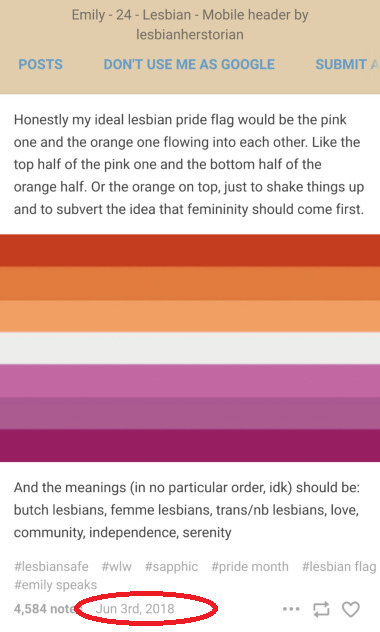

(I would also like folks to keep this screenshot in mind, as it'll be important for debunking the next myth).
Fact: The flags are actually *completely* different hue shifts.
When I did a hue shift of both the MLM flags *and* Lesbian flags (both Sunset and Lipstick), I got different results.

(I forgot to make a diagram with the hue-shifted MLM flags, but I do remember what it was supposed to look like so I went ahead and made one instantly)

See the difference? All it takes is one hue shift to prove a myth wrong.
Also, this is where things get really interesting. Outside of the original Lipstick Lesbian flag excluding trans lesbians and butches (Note: I consider the Lipstick Lesbian flag and Pink lesbian flag different flags), I think people forget the Lipstick Lesbian flag itself also has accusations of plagiarism.
**Queer History 101 is now in session**.
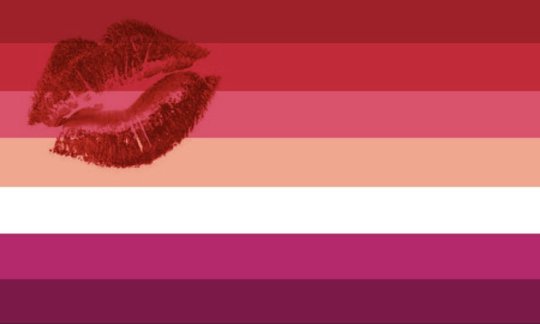
This flag shown above is known as the Cougar flag. This flag was created around 2008 by a gay man named Fausto Fernos. He created the flag to bring light to sexism and ageism in the community (especially women's communities). It was inspired by the Bear Brotherhood flag.
The Lipstick flag was created in 2010. And you can very much see the similarities between the Lipstick Lesbian flag and Cougar Flag. This is because the creator of the Lipstick flag stole the design of the Cougar flag and didn't give credit. I do not know if it was intentional, but knowing the Lipstick flag's creator's yikes history, I'm willing to make the bet.
So basically, the Lipstick Lesbian flag itself is the one that is a stolen design, and not the MLM flags.
**This has been Queer History 101 with Shadow**
Myth 2: The creator of the gay man flag is a transmed.
Fact: A transmed actually reposted the flag and claimed it as their own, which caused folks to believe they were the creator.

Take a good look at the date.
Now look at the date of the original post shown below (and just before anyone else does it, r/uselessredcircle. I'm too exhausted to screenshot the date so I'm just posting the screenshot again)

The creator of the flag has also expressed discomfort about transmeds using it (or, rather, reposting it for that matter lol) as well.
Myth 3: The flag is bad because it has no meanings.
Fact: While it's true the first flag didn't have meanings originally, that doesn't automatically mean the flag is bad. There are millions of pride flags out there that don't have meanings. Suppose we should stop using those flags now?
Myth 4: The creators are racist.
This one is also incredibly false.
Fact: Another user made a very poorly worded comment and was mistaken to be the creator.
The creator of the second ocean flag has already made a statement on this one (Here).
Additionally, as of late I've seen another rumor going around that the creators created a flag that was antiblack *and* fetishistic. That is also false. Nobody knows who created that flag.
Last myth: The creators support Bi/Pan Lesbians.
(SIDENOTE: Before anyone comes at me, I am a bi lesbian myself. I am simply pointing this out. And do take a look at my Mspec Lesbian exclusionism analysis for info on why excluding mspec lesbians is bad).
(EDIT: I no longer identify with the bi lesbian label, however my point still stands).
Fact: While one of the creators did make some bi lesbian flags (as a request by the way), idk if that means support. The other creator, however, has already stated that he is staying away from the discourse surrounding them. Not partaking in discourse is NOT a stance on something.
Additional notes:
-Not using a flag/label is NOT a stance on something, and saying otherwise makes you look like a gatekeeper. /nbh
-That being said, using a specific flag does NOT make anyone a bad person. Yes, even if someone chooses to reclaim the pink flag! (Speaking of, I highly encourage reclaiming it, since it's very pretty!)
-Flag discourse overall is just stupid. Go do something more productive if you can. /nf /nbh
Additional info/sources (Warning: Sources may contain reclaimed slurs).
Fausto's statement regarding the cougar flag being stolen.
Gayflagblog's FAQ (Archived version)
A twitter thread with more info. (Archived version)
Spreadsheet of the allegations against the creators (Note: This one is formatted a little weird, so proceed with caution).
A carrd featuring other MLM flags.
The site I used for the hue-shifts.
#lets talk about stuff#finally this is done#discourse tw#just in case#gay#lesbian#mlm#wlw#transgender#tw transmisia#tw transmed mention#truscum dni#exclus dni#reblog safe#reblog encouraged#analysis#mogai#lgbtq#liom#queer#nonbinary#achellian#mlm wlw solidarity#gay lesbian solidarity#antiblack tw#racism tw#edit: yeah im removing the carrd owned by an exclus since it doesnt feel right giving them a platform
21 notes
·
View notes
Text
Identity Politics and Racism: Some Thoughts and Questions
by Elliott batTzedek
Published in Rain and Thunder Issue #5, Winter Solstice 1999
This article is excerpted from a much longer essay analyzing the role of Identity Politics in Feminist and Lesbian communities. I wrote this work as part of my MS in Women’s Studies, and was therefore free to combine theory and metaphors from political science, anthropology, and history with a freeflowing form of autobiography. The larger essay, entitled “Suckled at Sarah’s Breast,” is mainly concerned with the creation and defense of boundaries around various identities.
What I want to bring out of this bigger work to Rain and Thunder are two ideas: how the wholesale adoption of Identity Politics (IP) by Feminist communities shaped (and limited) our discussion of race, and how an understanding of the need of IP to defend boundaries created some of the ugliness that has happened in our communities around race, racism, and other oppressions. But to get there, I need to first explain two of my underlying ideas/bodies of knowledge: my working theory about how IP defines which identities “count,” and what anthropology has to say about social groups and the ways their conscious and unconscious behavior around “taboo” subjects reveal deep beliefs about how the world is structured.
Identity Politics: Background and Strengths
Let me give you a vastly oversimplified, yet still basically true, version of how Identity Politics came to be. By the middle of the 1960’s, the heady, heroic days of the Civil Rights movement were ending. Major battles had been won, territory had been granted, and the vast, multi-racial group of people who had won so much were faced with having to settle in for the long haul. Like all movements, there were splinters and splits and disagreements; the unity began to wear, as Black participants began to live the message of self-love and pride and grew weary of the continuing liberal racism of their white cohorts.{1} Black activists began to build Black Power, and women, who had had it with the macho posing, began to come see themselves as members of the group Women and break off in search of their/our own agendas. As the New Left reached its final days in the late 60s and early 70s, Identity Politics became the guiding philosophy of social-change groups and communities. IP is what I learned as Lesbian Feminist politics, learned so deeply and well, in fact, that reading about its history sometimes shakes me up; for my first dozen years as a Feminist dyke, IP seemed not like a political theory, but a description of how the world actually is.
Like the permeations of New Left groups before it, Identity Politics is based in a search for “authenticity,” meaning, and civil power. Within IP, each person’s identity is based in membership in various social groups or categories, and that membership is seen as inherently politicized. Each identity group took from the Civil Rights victories the political stance that their identity is an inherent, immutable category. Because membership in this category is innate, the argument went, full membership in Civil, democratic society must not be blocked. “This is who I am,” the Civil Rights argument said, “and I didn’t choose it and I can’t change it, so you must give me rights based on this.” The fallout of this choice of strategy is still with us in many ways, including the horrified proclamations by many Black clergy that the call for Gay and Lesbian civil rights is nothing like their own fight, for Blackness is immutable whereas “homosexuality” is chosen.
And before I go on to talk about the huge limitations that came with defining identity and politics in this way, I need to say that the version of Identity Politics I came into as a Feminist and Dyke has been of tremendous value to me. As only one example: going off to a middle-class college and learning to pass as middle-class was really destructive to me. I got a BA in literature, but lost my ability to write because I could not give voice to my now-silenced working-class life. Recognizing that I had been raised working-class and connecting with other working-class women gave me my life story back. It helped me identify and laugh at the shame I had internalized, helped me find pride and strength again, made space for me to write a story such as this. I don’t think the questions IP asked, the positions it built or the answers it invented are at all silly or useless or wrong. I think they are limited by the nature of the political world around us, and by their own nature. The strategies, the activists, and the demonstrations accomplished a lot of change. The emphasis on cultural pride reconnected people to their lives, and encouraged the construction of historical narratives of resistance that greatly strengthened “identities” that had been devalued in the US, such as women, Chicanos/Latinos, lesbians, disabled people, and more. And, of course, the groups that invented the strategy which became IP, the Civil Rights and Black Power Movement, accomplished amazing things. As Paula Rust argues at length in Bisexuality and the Challenge to Lesbian Politics,
the adaptation of IP (alongside Feminist politics) created space for lesbian identity to take shape and to become a social force, for “any group that could adapt the language of ethnic politics to its own ends could tap into a well-developed social change ideology.”{2}
Identity Politics: Structural Flaws
Yet–and a very large “yet” it is–from here and now, my mid-30’s in the late 90’s, I know this about Identity Politics (at least the versions I learned and lived within): we messed up, at the beginning, first by choosing to reify identities as they were already defined in the world, and then by describing these identities as if they were inherent to us in some way instead of as descriptions of positions within extremely hierarchical, preexisting social structures of power. “Woman,” for example, was one of the main identities of IP, as a statement of biology. “Of color” was another main category, with groups dividing around the racial categories recognized within the US. at the time, as if those categories were physical features and not a colonial classification system. “Class” was another group, although its boundaries were never as tightly guarded because it couldn’t be treated only as a physical or inherited “true” self. “Jewish” was a group; “Muslim” should have been, too, as people “oppressed by the tyranny of X-tianity,” but there was only silence around the different but overlapping categories of Muslim and Arab women.{3} “Lesbian,” as opposed to “heterosexual,” was the other main identity of Feminist IP, although not until after years of skirmishes around defining “lesbian” as a statement of feminist politics, when it settled into being a “sexual orientation” or a “sexual identity” determined in early childhood or at birth.
So what was wrong with these categories, since all of them do describe who we are in the world? What they describe are places within a broader society which, at its very foundation, uses gender and racial categories to establish and maintain a small powerful elite. The problem with them is that simply restating the categories ignores the deeper truth that all of these categories are a creation and expression of social power. Race and gender aren’t pre-existing reality; they are socially constructed categories.{4} By choosing to build identities around these constructions instead of choosing to attack the ways the categories had been constructed, IP from the outset seemed destined to be more concerned with establishing new boundaries than with eliminating the establishment.
From this initial choice has grown years of skirmishes around defining those pre-established categories. If you’ve worked within Feminist and Lesbian groups, you know what I’m talking about. Who exactly is or isn’t a woman of color? Are Jewish women “of color,” or are we white? Is a woman with a Latina mother and white father, who was raised as white in a white world with no Latina culture an “authentic” woman of color? And on, and on, and on. Within IP, these questions felt like life and death issues, felt like we were defending thin boundaries of Radicalness. But looking back, I have to ask what ultimate change was served by dividing into “white” and “of color” when the social meaning of “white” was rarely explored, and both identities were treated as if they were actually about the color of skin? {5}
Imagine, instead, if we had taken all that insight and work and decided to explode “race” as a category. Not to ignore it, to be “color-blind,” but to no longer honor definitions that grew from and continue to uphold colonialism?{6} What if we had been doing thousands of workshops that went beyond saying that racism is learned to saying that race itself is learned? What if we pushed white people not only to try to stop being racist, but to try to stop being white, to actively become race resistors and race traitors?
But Identity Politics wasn’t willing to say that race itself either is learned or is a social construction. Activists within the world of IP relied instead on seeing race, gender, and other identities as inherent, immutable categories from which to wage a battle for a place at the table of power in broader U.S. society. Even groups that were mainly or entirely Separatist from their onset used this understanding, because, I think, it was the most successful strategy anyone had seen in a long time. Such a position was a strong base for fighting, but in the end, granted a position from which to fight while taking away our best weapons – questions. As long as we could ask questions about how power around us was constructed, we stood a chance of cracking open the foundation. But after we began to think of our social positions as identities that were “real” or “‘inherent,” the question of how they were built, or why, became unnecessary, maybe even unthinkable. Once Identity Politics became the organizing structure of our social change groups and communities, the question of how whiteness could be taken apart all but disappeared. Anyone reading this knows without thinking about it that racism is learned, and can cite at least a hundred racially offensive words, phrases, or ideas, but could we, together, list more than five things we might do to actually stop Whiteness? I know that Rain and Thunder, like other Feminist journals, is likely to get few or no articles in response to their call for contributions for an issue about fighting racism. Our entire dialogue around racism has become anthologies of women writing almost exclusively about individual racist words or actions directed at them. These are valuable, both for the women writing for them and for those of us who are always struggling to understand more about racism’s details and women’s lives. But the profusion of detail should not be confused with having new ideas about what to do.
Another important problem created by Identity Politics was what to do with “oppressor” categories. If we were going to argue that social categories of race and gender were inherent identities, what in the world were we going to do about maleness, whiteness, heterosexuality? To talk about these “identities” within the framework of IP would be to say either: 1) those people were also born that way, inherently flawed or 2) those people were not born that way. The first option wasn’t going to work 100%, because then the ultimate answer to social wrongs would be to get rid of all of the members of certain categories. Even for those of us who like to fantasize about a world without men, this answer was too genocidal, too ugly, and too simplistic. For those of us who are white feminists, this argument was particularly ironic, unless we actually believed that only white men ever benefited from racism and that it would die with them, thus preventing us from being the next on the list to be destroyed in the name of ending oppression. The second option would, of course, lead to revealing IP identities as socially constructed, undermining the very base IP was built on. Because either option would lead to uncomfortable questions, I think that IP simply chose not to engage with these “oppressor” identities at all.{7} In the years that Identity Politics was being constructed, white men dropped out of political activism in droves, and white women either invested heavily in a universal view of womanhood or choose to talk about themselves only as victims of gender oppression.
Of course, not engaging didn’t make these “identities” go away. And for all that IP has strengthened social groups such as “women” and “people of color” by encouraging us to talk among ourselves about our lives, it doesn’t have answers about how to bring down the foundation of the power we are up against. Sure, we feel empowered, but, as Audre Lorde was prone to ask, empowered for what? By insisting on measuring who we are only by the social categories we were born into, IP mirrors social power as it already exists by setting up identity based on opposition. ‘Woman” is “not man,” “of color” is “not white,” “lesbian” is “not heterosexual,” just as “man” is “not woman,” etc. Even while both IP and mainstream power claim that social categories are real, both actually define groups by what they exist in opposition or resistance to, instead of anything that could exist in its own right. Within both systems, members of groups therefore act out a lot of anxiety about the groups’ boundaries, and therefore engage in ritual pollution behavior. People who exist on the margins of these groups, or who blur the categories in some way, become sources of threat, and have to be purged or made invisible for the “safety” of the group. Feeling “polluted” comes easily to a group which shares only a sense of what it is not, and the rules/customs/laws that protect the group will always demonize categories of people who are threatening, and will act to purge polluters in rituals that are quick, public, and ugly.{8}
Ritual Pollution and other threats to social power
“Dirt is matter out of place. This is a very suggestive approach. It implies two conditions: a set of ordered relations and a contravention of that order. Dirt then is never a unique, isolated event.” -Mary Douglas, Purity and Danger{9}
It is a very difficult thing to step outside of one’s worldview to question it–think of the effort needed to get women to see women’s oppression. When I was searching for a way to step out of Identity Politics in order to think critically about it, I eventually turned for tools to anthropology, the study of human culture. I began to look at the ways all cultures deal with those things that are “ritually impure” or ritually “polluted.” Both of these terms refer to same idea, which has nothing to do with physical dirt, but instead is about how categories of meaning are created, and how social proscriptions are upheld. A quick example: imagine being asked to shake hands with a mortician. Consider your first response. Sure, it’s irrational, and mainly unconscious, but very, physically real–and, as such, is pure and simple pollution behavior. Even ‘advanced’ societies like the US, which claim no such “primitive” behavior, carefully control, by law or custom, everything understood to be ‘dirt.’ U.S. culture draws boundaries around death and corpses which regard the dead and all who touch them as ritually impure, and proscribes behavior for those who become polluted by dealing with the dead. In some vital ways, you might think of ritual pollution as the factor that makes you say “yuck” to things that you have no rational reason to abhor.
Anthropologists usually think of ideas of ritual pollution/impurity and ritual purity as guides to the deepest, organizing beliefs of a culture. Pollution behaviors are invoked when an individual or group faces a serious crisis: death, invasion, widespread disease, threats to underlying social power. If we use pollution behavior as a lens for thinking about the ways groups respond to challenges, we can examine the cultural category being challenged and locate who feels that challenge as an attack upon their self-hood and therefore their very life. Think about the phrase thrown at lesbians, Feminists, and cross-dressers: “You people make me sick.” Think of how the person screaming this phrase may commit physical violence against what so disturbs him/her. This is one extreme of purity laws being violated and of the resulting pollution behavior. “Even to gaze steadily at distorting apparatus,” Douglas writes, “makes some people feel physically sick, as if their own balance was attacked.” What is the danger Lesbians and feminists and crossdressers pose in common? We cross and blur gender lines. Why is this so threatening? This is an easy question for Feminist theory, for we’ve encountered it so often: because strict gender divisions uphold male power, and our society is about a gender hierarchy at its very core.{10} If we add to this an understanding of ritual purity and pollution, we come to see that those in power do actually feel sick, feel their lives being threatened. Knowing this, we can better understand the force behind the backlash. Men protecting male power have a much clearer view than Feminists do of exactly how threatening crossing gender is. Because we don’t always get that we are threatening their lives, we are unprepared for their ability to morally justify any response, up to deadly force, as self-defense.
Purity and Ritual Purity
But let me backtrack for a moment about the idea of “purity.” Feminists, especially Radical Feminists, have for years been accused of engaging in “purity politics” and/or “political correctness” as a way of belittling or ignoring the issues we raise. This type of “purity” is a different beast than the study of purity/impurity ritual behavior that I use as a way to think about my communities. The former, a kind of Ideological Purity, comes, I think, out of one of the most dangerous parts of Christian ideology, a belief that one must have “purity” of soul, mind, and body. This worldview has driven many inquisitions, and the kind of antipornography crusade obsessed with men’s souls but not women’s pain. The latter is a way of thinking about unwritten cultural rules and categories and their influence on behavior. In this work, I am mainly thinking about rules and categories.
But I can’t ignore ideological purity, for all of US. political life including Feminist community politics has a strong element of the push towards the Pure; U.S. thinking is Christian to its core in a way we are mostly unconscious of. In Feminist politics, this often surfaces as a way of monitoring women’s choice of words and symbols, condemning or praising one another for the form rather than content of our lives; behind this lies a mainly unspoken belief that, if we can attain a purely un-oppressive form, we will magically have ended oppression.
Ritual Pollution and Race: One Example
As a way to think about what analyzing pollution behavior can tell us about IP and race, consider the role of bi- or multiracial people in both mainstream and IP cultures. In both, they have a clear mandate to identify with only one racial identity. Mainstream culture either insists on either seeing them clearly as “of color” (if their features/skin do not look “white”) or on telling them to shut up and pass (if their features/skin look “white”). Within Identity Politics such people are told that they must classify themselves as “people of color.” If they choose to identify as white, or to embrace their white heritage in any way, they are labeled traitors, or are accused of “selling out,” and are often purged from groups or organizations.
Why? Because, in a society built on a hierarchy of race, bi-racial people are in a profound sense marginal and, as Douglas explains about all marginal people, “These are people who are somehow left out in the patterning of society, who are placeless. They may be doing nothing morally wrong, but their status is indefinable […] and their ambiguous status in the structure makes them appear as a danger to those belonging fully to it.” Bi- or multiracial people who insist on claiming all of their identity categories reveal that the racial categorizing which underlies U.S, society is entirely constructed; there is no “white blood” or ‘black blood.” Neither is there a mindset which is genetically linked to skin color. But mainstream White culture cannot admit that White is a category of power, not skin color, and IP cannot admit that anyone who is not fully “of color” could ever have an “authentic” experience or understanding “of color.” “In short,” Douglas writes, “Our pollution behavior is the reaction which condemns any object or idea likely to confuse or contradict cherished classifications.” Bi-racial people who refuse to make a choice are shunned by mainstream and IP cultures, either treated as objects of ridicule (“she doesn’t know what she’s talking about”) or made invisible.
What All of This Has Taught Me About How NOT to Deal With Oppression
There are many kinds of boundaries around groups. Some are physical: our land goes from the mountain to the river. Some are cultural: our people are the ones who dress and speak like us. With the arrival of the nation-state, boundaries became geo-political: invented lines on maps which states enforced with armies. Without state power, nor a common culture, nor physical boundaries, Identity Politics used what I call geo-paradigmatic borders, ideology-based but still clear and enforced boundaries around groups which are defined by their political and theoretical approaches. These new boundaries were built upon the pre-existing chaos of our lived experience of identity: a crossroads of social meaning, personal meaning, personal and social history, and spiritual, emotional and theoretical understandings. Having boundaries tidied the chaos, gave us a clear sense of purpose and a way to tell “us” from “them.” As Douglas explains, “Rituals of purity and impurity create unity in experience … [I]deas about separating, purifying, demarcating and punishing transgressions have as their main function to impose system on an inherently untidy experience.”
Out of the chaos of our lives rose answers based in our experience, explanations for what happens to us, suggestions for gaining our own kinds of power. But this process of separating came with a strong need to defend boundaries, for two reasons: 1) the chosen identity categories really aren’t inherent, but are built on the lies of existing social power, and 2) many of the identities were mainly defined by what they were not, so didn’t have a strong center. Because these underlying, organizing structures were not to be spoken of, calling them into question in any way was sure to invoke pollution behavior.
As part of this pollution behavior, all challenges and transgressions were met with intense boundary-setting and defending, including separating out and/or purging those seen as a threat. This drive toward purity and punishment almost always happened in the name of addressing “oppression,” of eliminating ‘bad’ knowledge and attitudes and replacing them with the “truth” which would, as the saying goes, set us free.
But is achieving ideological purity and conforming within well-defended boundaries the same thing as having equality and freedom? Did all of our purging of “oppressive” people and ideas change anything? From the window into my own culture offered by considering pollution behavior, I’ve been thinking about how I’ve seen charges of being “oppressive” function within IP groups. This is the scenario played out time and time again: tension builds within the group, sometimes around an actual problem, but usually, I think, around leadership and position within the group pecking order. Everyone in the group has the feeling that something is wrong. Then someone who either has power within the group or is trying to gain power names the problem. Within Leftist/Feminist IP groups, the problem is often identified as “racism.” Racism is, after all, an easy target because the effects of racism are always present, because theorists of color have worked so hard to make visible its working, and because we do honestly want to be anti-racist. Of course, charges of classism, anti-Semitism, ageism, etc. also work. However, no matter the charge, whether or not it is taken seriously is more about the social status of the accuser within the group than about the presence or absence of discrimination.
Now, sometimes, when the charge is leveled, the point is to actually describe and interrupt racism or classism, or whatever the problem at hand is. When this is the case, and the accusation isn’t about defining personal or group power, positive change can actually happen. I saw this in effect at the “Intersections and Parallels” anti-racism conference in Iowa in the late 80’s, when the established social norm was that we would all make mistakes, and that doing so did not prove you weren’t dedicated to ending racism. In this setting, I watched as a Jewish daughter of immigrants sang the song ‘We all came over on different boats, but we’re on the same boat now,” and Native women raised a completely justified complaint. Because there was no power to be gained by purging anyone, the singer had social space to say, “You’re absolutely right. I hadn’t thought about that,” the Native women had a chance to educate everyone, and no one left the conference in tears only to be written up in national Feminist press as a “danger to Feminists.”
However–and this is a BIG However–too often these rituals are about establishing or maintaining power within a group. Often, the exact nature of what “racist” thing has happened is not clear. Or, if it is, the “degree” of the problem becomes defined by how much status the accuser has in the group; not all women of color are granted equal authenticity, so some can stop a festival with a sentence, while others are simply ignored. Regardless, it is not the clarity of oppression that matters, but rather the sheer fact that the “problem” has been named at all. If the charge is granted power, the group must act to fix the problem; members must choose a path, either changing something within the group or within group members, or by identifying the source of the “threat” and purging it. The former can happen, bringing real change. But usually the latter happens; some marginal person–someone who never quite “fit” in the group anyway–or some outsider, is identified as the “racist” one and is publicly purged. “Ah, triumph” the group then sighs with relief, “see, we’ve addressed racism!” Or, if the accuser doesn’t have power within the group, she herself is purged, as a way of “proving” that the accusation wasn’t real.
Sheer pollution behavior, this is. If all of this purging was ever actually about solving the problem of racism, it would be long since solved. Instead we have endless re-enactions of the scapegoat ritual, except that in this actual ritual, the group members knew that they were putting their “sins” onto the goat and sending it into the wilderness; they didn’t pretend that the goat itself was the source of “sin” in the community. Within the boundary-defending war games of IP, where our social group is our inherent identity, it is far too easy to confuse the “sins” and the goat. This confusion has cost us precious time, over and over again, as we’ve used pollution rituals to make the group feel better without actually addressing racism or race, or age, or ability, or economic privilege. Purging has actually kept us, time and time again from being able to challenge oppression and exploitation by focusing on one person’s “bad” words or action instead of asking questions about power.
Purging has also cost us our most precious resource–women of good intention who actually do want a different, more just world. The point of a purging ritual as we’ve enacted it is not only to make the group feel clean, but to make the “guilty” party believe in her guilt. If, for example, a lesbian group could only get Susie to admit that she was, in fact horribly oppressive and would leave for the good of the group, then the lesbians who remain never have to question themselves about their relationship to oppression or their role in banishing Susie. She admitted to the charge, so off with her head and everything is peachy again.{11}
Getting someone to confess and withdraw is the ultimate signal that pollution behavior is in full force for, as Douglas writes: “Pollution rules, by contrast with moral rules are unequivocal. They do not depend on intention or a nice balancing of rights and duties. The only material question is whether a forbidden contact has taken place or not.”{12} If Susie confesses to being oppressive, the problem of “oppression” is solved, clearly and absolutely, with no left-over, messy issues of intention or meaning. “A polluted person” Douglas writes, “is always in the wrong.” Even if she doesn’t confess, a public campaign against her can work to convince everyone that she is the source of the pollution, so that no one has to look any further upstream.
Once Susie has been identified and purged, she is gone forever, there is no way for her to become “ritually pure” again. This is another function of IP’s denial that it is engaging in pollution behavior. In societies with conscious pollution rituals, there were clear rules for how the ritually impure person could re-enter. Within Hebrew tribal laws as described in Leviticus, for example, people who had become impure would wait outside of the camp until nightfall (that is, the beginning of a new day by the Hebrew calendar), do ritual cleansing with water, and then return, understood by all to no longer be polluted. Within our Feminist and Lesbian communities, where we leave all of this unspoken, there is no way back in for Susie once she’s been labeled as racist or classist or ableist. Her status of polluted will follow her from community to community, long after anyone cares to remember what happened, as if she personally had the power to bring social, economic, and spiritual oppression to any place she enters. Nothing she has ever done, or will ever do, to bring justice into the world will matter to her status as impure. And so we have lost women, one at a time or in groups, sending them into the wilderness bearing what should be our responsibilities. We’ve done this for years, then we wonder why there are so few of us left in “the fight,” blaming those who are gone for having “sold out.”
And In Conclusion, As Such….
So, where does all of this leave us? I don’t have a solution to offer, clear actions to take. I see a direction to go, toward more action and less searching for a purity of form. We have to start scheming about how to disrupt the meaning AND power of Whiteness; we have to figure out how to be at least as courageous in the face of white as we have been in the face of male. We need to become deeply focused on how we think and talk about race and other oppression: do we understand difference and privilege as a source of inevitable conflict, or do we see the chance to learn something new, to work together with other wonderful creative women to find new pathways out of the trap of who we were raised to be? For those of us who are white–are we willing, in the name of forming bonds across divides of race or class or age, to be in spaces with women who don’t share all of our answers or opinions, or will we roll our eyes, laugh to one another about them, or feel the need to “confront” them about their use of word X or image Y? Maybe what I’m asking, as much of myself as of anyone else, is whether we’re willing, finally, to let our dream of a just and safe world be bigger than the little kingdoms of our identities. And, if we are willing to do this, can we do so in a way that has nothing to do with feeling ourselves compromised and everything to do with a life of integrity.
FOOTNOTES
For more on the history of this, see Douglas Rossinow’s book The Politics of Authenticity: Liberalism, Christianity and the New Left in America (New York: Columbia University Press), 1998.
Paula Rust, Bisexuality and the Challenge to Lesbian Politics: Sex, Loyalty and Revolution (New York: New York University Press, 1995), p. 173. In a very interesting discussion in the chapter “The Pink and Blue Herring,” Rust explores the tensions within lesbian identity created when both “ethnic” discourse and feminist discourse were used to explain lesbian identities.
In her introduction to the anthology Food for Our Grandmothers: Writings by Arab-American and Arab-Canadian Women (Boston: South End Press, 1994), editor Joanna Kadi writes: “…after one particularly bad day, I coined this phrase for our community: The Most Invisibles of the Invisibles. [… ] It raises questions about who the other invisibles are, and whether Arabs really are the most invisible. I believe we are. In the United States and Canada, it is not only white people who refuse to see us, it is other people of color–Latinos, Africans, Asians, Natives–who do not acknowledge our existence.” (pp xix-xx) Even the call for writings for this very issue never mentioned Arab women. They simply don’t exist in U.S. Feminism.
This should not be read as saying categories of race, gender and culture aren’t socially real. People are discriminated against, tortured and killed everyday because of belonging to these categories. We can’t ignore social reality, but we also can not treat it as the only reality.
I still remember the shock of a Costa Rican woman in my graduate program when we explained to her that, in the U.S., she was “a woman of color.” She held her arm next to ours, and asked us to explain the difference. That day, we didn’t even approach the idea that she, a member of the ruling class, might also be considered “a third world woman.” So much of U.S. Feminist thinking is still so limited by ideas based in U.S. citizenship categories that we continue to be a source of great mystery and humor to more international-based feminists.
One thing we would have gotten, of course, was tremendous resistance. The U.S.’s entire definition of itself is based in mythology about race and racial difference, and to attack this mythology is to try to violate a national boundary; to violate the national boundary of a state supported by military power is become the “legitimate” target of deadly force. For an excellent analysis of the mythology, and examples of the deadly force the state uses or permits, see Mab Segrest’s Memoir of a Race Traitor (Boston: South End Press, 1994).
I’m not suggesting here that no one ever asked what men, or whites, or Christians “get” from power, because a lot of good theorizing has been/is being done around these issues. I am saying that, for the most part, the upholders of IP went merrily along guarding boundaries as if that work had no implications for the identities they were protecting.
And by “ugly” I mean a range of behaviors from the very public trashing of a woman to lynching campaigns to the Witch burnings. Remember, when people in any kind of power feel threatened, they can justify any act as self-defense.
Mary Douglas, Purity and Danger: an analysis of the concepts of pollution and taboo (London and New York: Routledge & Kegan Paul, ARK paperbacks), 1988.
One might also then intuit that strict racial divisions uphold white power. Why, then, are self-identified Radicals within IP so invested in their racial categories? A very good question.
As women, what we seemed to have learned from being the target of victim-blaming for thousands of years is not to avoid doing it, but to be better at doing it, and better at hiding the process of doing it.
In our wider society, think of how the U.S. is handling people’s fear of violent crime: not by passing gun control or ending poverty, but by passing “three strikes and you’re out” laws, invoking the unequivocal laws of pollution instead of the measuring and weighing of justice. Something is wrong, everyone knows it, and people already on the margins–in this case, mainly young, poor Black men–are going to be held responsible for our sins and be cast into the desert.
0 notes
Text
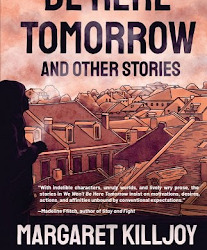
Many of the stories deal with blurred lines between fantasy and reality, where superstition and belief end up with their own kind of practicality. As someone with OCD who struggles with compulsions and magical thinking, these stories were deeply compelling to me. The collection is cohesive in tone while ranging through a variety of settings and many kinds of queerness. They're usually first person narratives, which wholly inhabit a different way of thinking about things in each story, all while remaining extremely accessible and evocative.
Full Review at Link
0 notes
Text
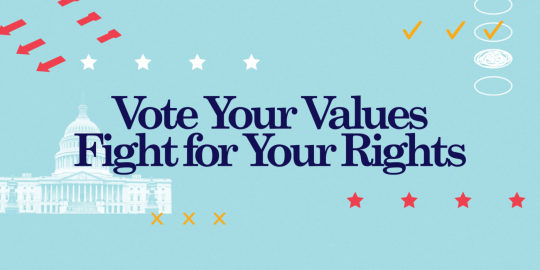
We need to fight back, so vote
With elections right around the corner I feel that I must speak out about this topic yet again. Only we can change the world but only if we ban together and vote out those who are trying to control the world and our bodies. I can't believe that in this day and age that I am even writing this but unfortunately here it is.
Bans have passed at least one legislative chamber in seven states: Arizona, Idaho, Wyoming, Florida, Kentucky, Oklahoma and West Virginia. They have been enacted in six of those states: Florida, Oklahoma, Kentucky, Arizona, Idaho and Wyoming.
With Roe v. Wade’s future is uncertain, thank God that many states are pushing legislation that will support women and their bodies. Some 30 states and the District of Columbia are considering measures that protect and expand access to abortion. Laws that protect the right to have an abortion already exist in at least 16 states and the District of Columbia.
Some states have gone further: Lawmakers in Vermont voted to move forward on an amendment to the State Constitution that would guarantee the right to an abortion. In Connecticut, lawmakers approved a bill that would expand the field of people who can perform certain types of abortions beyond doctors, to include nurse-midwives, physician assistants and other medical professionals.
I remember writing about when Georgia became the fifth state to ban abortion at six weeks after a last menstrual period. I was outraged as this "time frame" will be before many women will even know that they are pregnant.
These laws go even further than the other laws, even as far as criminalizing doctors and others who help induce abortions. It will now charge pregnant women for murder if they decide to have an abortion... even if they go to another state. Then they decided that wasn't enough and will even charge the person that drives you there as well with attempted murder.
Wtf is going on here? How in the world did this bill get passed? Where was the outrage? Where was the outcry of injustice?
How much more restrictive could these laws get than charging a women with murder on her own body? Are we now going to burn them on a stake? Hang them in the square?
This is where we are headed on but not just on abortion, people. The good old boys are in charge, they have already brought out their white sheets they had been hiding for so many years. They are loud and proud of their racism, their disgust of the gay and lesbian community and now they just want to bring us straight back to the fifties, as they are slowly outlawing our abortion rights and other rights to come. What you don't remember the don't say gay bill Deathsantis passed here in Florida.
I am mad as hell!! Because this is what happened in Germany or don't you remember because our textbooks no longer teach our children the hideous crimes Hitler did to millions of people.
First they started by taking away rights of certain people, small things at first. Then they added others, until before they knew what hit them, all of their rights were gone and he was a vicious, murdering dictator.
Wake up people! They want to put the gays back in the closet, the blacks and minorities on the back of the bus again and now abortions in the dirty back alleys, where they once were in. Who's next Jewish people, Christians? Anyone who doesn't believe and look like them?
And why are we not mad as hell? What is wrong with us as a country? Are we so self absorbed in our lives, in our "likes" In our own crap that we don't see this? This is not going to get better, trust and believe, it will only get worse. This may not affect you, but trust and believe they will eventually take away your rights, then how will you feel?
I had to have an abortion at 15 because of a rape, it was my body, my choice. It will always be my body, my choice. Are you going to ban women from cosmetic surgery to change their bodies too? No, that would never happen as the good old boys like big boobs to grab as they may! Where does the line stop?
We must speak out, we can change this now! We need to vote out these people, we need to write to our congressman. We need to speak out about our government, we need to protest, to write about it, to speak out, and speak loud as this is going to affect everyone sooner or later.
I will leave you with this famous quote from Martin Niemöller about the Holocaus that I hope will be an eye opener for you because this could be us...sooner than later.
"First they came for the socialists, and I did not speak out—because I was not a socialist.
Then they came for the trade unionists, and I did not speak out— because I was not a trade unionist.
Then they came for the Jews, and I did not speak out—because I was not a Jew.
Then they came for me—and there was no one left to speak for me"
Vote! Speak up! Speak loud! Do it today!!
"Be the change you want to see"
@TreadmillTreats
"Be the change you want to see"
@Treadmilltreats
"And just when the caterpillar thought his life over...he turned into a beautiful butterfly"
**Now released my latest book**
The Blessing in Disguise.... revealed
https://www.amazon.com/Blessing-Disguise-Revealed-story-faith/dp/1074340493/ref=sr_1_19?keywords=the+blessing+in+disguise&qid=1561392004&s=books&sr=1-19
***Now available***
My 1st book The blessing in Disguise
Selling on my website:
Http://www.treadmilltreats.com
And on Amazon.com
http://www.amazon.com/gp/aw/d/0692437398/ref=mp_s_a_1_13?qid=1462358109&sr=1-13&pi=AC_SX236_SY340_FMwebp_QL65&keywords=the+blessing+in+Disguise
http://www.am6azon.com/gp/aw/d/0692437398/ref=mp_s_a_1_12?qid=1434452632&sr=8-12&pi=AC_SX110_SY165_QL70&keywords=the+Blessing+in+Disguise
My weekly Youtube page, please subscribe:
https://youtu.be/LDSXCFJVnzM
Http://www.treadmilltreats.com
Twitter: treadmill treats
Instagram: treadmilltreats
Facebook :treadmill treats
Http://Www.treadmilltreats.com
#treadmilltreats
#Theblessingindisguise
#blog
#blogger
#love
#instagram
#lifestyle
#blogging
#influencer
#bloggers
#bloggerlife
#Garyvee
#Jayshetty
#write
#writer
#motivationalspeaker
#motivation
#motivationalquotes
#motivational
#inspiration
#success
#quotes
#soulsisterssoulution
#NewYorktimesbestseller
#Oprah
#TylerPerry
0 notes
Text
["Dannia and I did several anti-racism trainings together. Our workshop model began in the morning with written personal reflections, moved on in the afternoon to role-plays of interrupting racism, and was supposed to end with a discussion of anti-racist activism. Our most effective ploy was a role play in which a white daughter or son returned home for Thanksgiving and had to deal with the father's racist comments over turkey— a scenario guaranteed to generate collective meltdown. We found that participants became so absorbed in the interpersonal issues that we never got to the activism. Were we starting at the wrong end of the process?
These politics will be recognizable to many lesbians who lived during these years. We had an ideological unity then that did not survive the 1980s, for better or for worse. Class and race divisions did not dissolve so easily in the solvent of our sisterhood. "Sex radicals" raised questions about the nature of lesbian and female sexuality that many feminists, straight and lesbian, had no tolerance to hear, and the "sex wars" tore through the community. AIDS soon began to impact all of our lives. There were deeper schisms among women, and new alliances with gay men. A younger lesbian generation began to shape a different politics in the space that we had worked to open for them.
(...) Lesbian-Feminism in the 1970s taught that you should not work with straight women because they "gave all their [and therefore your] energy to men." After Feminary imploded, I figured, Shit, nothing could be worse than this. That's when I went to a meeting in Durham of the National Anti-Klan Network to hear from Leah Wise, Lauren Martin, and Reverend Wilson Lee that North Carolina had the worst Klan/Nazi movement in the country and they were looking for local people to organize. It was 1983 and I was ready to take the plunge. In this border crossing between the lesbian and feminist and the anti-racist movement, I began to realize how such movements separate people as much as bring them together. I found a compelling and complicated reality that neither race theory and organizing, nor class theory and organizing, nor feminist theory and organizing is capable of handling.
Lesbian-feminism had given me a clear analysis of how power operates among people and in a culture's institutions. But it gave me few of the specific skills I needed: how to put on a press conference, build up a computer database, interact with community agencies, organize white and Black people in small towns and cities, or monitor and call to accountability the criminal justice system. With Feminary, our battle had been largely interior, a psychic confrontation with the lethal forces of the culture as we had internalized them. It was an intense, revealing, but sometimes insular process. The "politics of identity" could easily slip into a politics of victimhood and guilt, its focus more purity of consciousness than effectiveness of social change. By 1983, I had hit the limits of this internal work. (I was not the only dyke to think that lesbian-feminism was dangerously over-literate and under-strategic.) Guided by the people who eventually incorporated North Carolinians Against Racist and Religious Violence, I set to work to learn to organize.
(...) The shit hit the fan about a year after NCARRV had begun our work in Statesville. A woman involved in the national work suddenly brought up gay issues across Flora's kitchen table. Flora and I were friends by that time. I had come out to her the evening she had asked me whether my interest in the Statesville work came because I also had a Black lover. She was on the right track, I had explained, telling her of my different outcast status. "We still love you," she had said, and reached across the table to take my hand.
Okay, I thought when the woman confronted me. You want this discussion, you'll get it.
Soon everybody had fled the room except my opponent, Flora, and me, as I heard how being gay was like being on heroin, and how this particular woman was raising her daughter to be heterosexual, and how she wouldn't want her organization to take a stand on homophobia because it might promote heterosexuality.
"If I ever have a child," I countered, "the main thing I will teach her about relationships is that she deserves love and intimacy and should never let herself be abused. What this is all about— gay rights and these cross burnings to which Flora and Joe have been subjected— is the right of human beings to love."
Flora stayed beside me, nodding agreement.
When I got back Durham, I called Leah Wise to report. Whenever an emergency arise, I could count on her to let me sit down near her desk for five or ten minutes to think it through. It was natural that I take the incident at Flora's back to her. She responded immediately, "This homophobia is like racism; it's got to be opposed." We arranged a further discussion with the woman in question, and Leah came with me for support. On the way back, Leah took the time to share with me all the things she saw me doing right.
I was intensely grateful. "Shit, Leah," I replied, wedged in the seat adjacent to hers on the plane. "I feel like I do not know what I am doing most of the time. All you folks have all this political history, and here I am flying by the seat of my pants."
"Actually, it's better that way," she said. "A lot of times, that other sectarian stuff just gets in the way."
Her ready support in challenging homophobia and her affirmation of my work marked a major turning point for me. If I knew my enemies, I also knew my friends. Perhaps I could stop looking over my shoulder.
Leah affirmed my instincts to build not just coalitions, but movements grounded in relationships. I figured I was doing work on racism and anti-Semitism because it was the right thing to do, and once I laid out the case about homophobia, the people I was working with would do the same for me and mine. I was not disappointed. The result was friendships that come among people who catalyze changes in each other. Our work carried a lot of risk, but the risk gave us occasions to develop substantial trust. I was scared shitless a lot of the time, but I never regretted what I was doing.
After thirty-five years, my life was no longer segregated.
Somewhere in my metamorphosis, I realized that I could not longer settle for "lesbian space" as just one room, or camp, or building, although I was, and am, still grateful for those gathering places. The Reagan era made it clear: there is no separate safety. "Lesbian space" had better be a world where everyone belongs."]
Mab Segrest, Memoir of a Race Traitor, The New Press, 1994
351 notes
·
View notes
Note
I feel like it's impossible to address the racism that white trans women perpetuate as a trans man of color. It makes me feel like I'm going crazy but so often I've seen these ww admit to being former anti sjw or racist edgelords before they transitioned and they see it like a fucking joke. Sorry to rant in your inbox I feel like I'm going mad and it's impossible to bring up such a delicate topic without people accusing you of being a transmisogynist or something
I can see that this is coming from a place of distress, and I want to acknowledge that 100%. I do think though that it's short-sighted to pin this on trans women instead of confronting the reality that white people overall, even if they are part of another marginalized group, whether it be religion, sexuality, gender, class, disability, etc. do have a history of failing to transfer that knowledge toward their understanding of race.
I don't think I need to get into all the issues of racism among white gays and lesbians that gets perpetuated beyond the dating sphere, and how difficult it is just as people of color to exist in a lot of mainstream LGBT places that will assume a conformity of experiences and backgrounds, and that fail to address the unique issues that come with being LGBT and non-white.
It's something that needs to be addressed across the board, and all white people in the community have to step up and help each other learn, because so often the burden constantly falls on POC to educate others. And yes, it's exhausting.
I have close friends who are white trans women who are deeply respectful and have been doing everything to listen and learn. I've known white cis gays/lesbians who don't particularly care at all, others who are outright racist, and every stance in between. Remember that the worst voices often get amplified on the internet, and it's not representative of the whole. The greater concern is the collective silence from the rest of the white LGBT community when we are left to contend with racism on our own.
36 notes
·
View notes
Text
people keep regularly being like 'it's problematic to hc Daisy or Basira as LGBTQ bc they're cops and cops actively oppress the LGBTQ community'
yes. yes they do.
but you know that like. gay cops exist? as well as Black and Asian cops exist? and you know they exist because My God They Will Tell You like. if you've ever been at a radgey feminist or queer activist protest...well, every single time I've been involved in police liaison for one the cops are Falling Over Themselves to tell you they're a Feminist Lesbian themselves here's a fun story about my wife and like. putting queer cops and cops of colour front and centre at relevant protests is uhhhh a very transparent attempt to manipulate you into trusting them and absolutely evidence of the police being cunts, but it doesn't mean they're lying about being LGBTQ/a person of colour. British police regularly actively recruit in marginalised communities because it makes them look better and allows them to use LGBTQ and BAME police as tokens which they think will help them gain trust in queer and BAME spaces.
and the fact that they're being tokenism and are generally treated like shit by their coworkers doesn't. let queer cops or cops of colour off the hook. a lot enter the police with the idea of improving it from within (and a lot don't) but ultimately they are still active enthusiastic participators in the system.
like I understand that what most people are actually saying when they say 'don't call Daisy and Basira wlw because they're cops' is 'don't treat them as your uwu unproblematic representation faves' which. Very Much Is An Issue
but I think the story with Daisy and Basira is so much about the messiness of Being A Cop, Trying To Stop Being A Cop and Being A Likeable Generally Decent Person Who As A Cop Does And Justifies Unforgivable Horrors and honestly the weirdnesses of cops from marginalised backgrounds is part of that conversation. like if you straight up just insist that being likeable or being gay or being a person of colour is incompatible with being a dangerous cop like. that's literally what the police want you to think, albeit from a different angle. The reason they send cops of colour and LGBTQ cops to liaise with protesters (and the reason those cops tell you unasked that they're gay) is because they know you don't trust cops, but they hope you'll a) take the cop as One Of Us bc they share traits or b) assume they're less of a threat because they're not white cishet men, and assume you can talk them out of being a cop. which. you can't.
like to me either Daisy or Basira being gay relates pretty well to the fact that both of them are actively written to be likeable/relateable/sympathetic and then the story repeatedly turns round and says "and that doesn't make it ok. and you still are not and cannot be forgiven. and the people you killed are still dead."
Basira and/or Daisy may be gay, may be GNC, may be people of colour, may be whatever else, but whatever else they are they are still cops who did and justified awful things using a system designed to protect them from consequences. the fact that they're traumatised and that they're likeable and that they care about people close to them doesn't make them not cops or not dangerous! even quitting being a cop (leaving the Hunt) while difficult and good, doesn't mean you weren't a cop and doesn't mean you're off the hook and everyone should just forgive and forget! like that's Very Explicitly The Point!
and those people exist! cops who are kind and funny and quirky in their personal lives, and express beliefs that you agree with at least superficially, and are gay, and are people of colour, and speak sympathetically about their experiences of marginalisation. and they're still fucking cops. and in many ways they're much more insidious than a white cishet cop who acts openly threatening bc you will trust them. you will think you can bring them around. but they're in and of the system and the system uses the recurrence of marginalised cops specifically as part of their targeting of marginalised communities, and talking about that isn't denying the reality of police brutality, police racism or police queerphobia.
#not every Marginalised Cops story is copaganda!#and yeah like if The Lesbian Rep or The Only People Of Colour are confined to cops that has Implications#but that isn't the case here#there should be space to talk in fiction about the existence of marginalised cops#and critique the ways cop-friendly media expects them to be exempt from criticism of cops#which is. exactly the pint that the police are leaning on when they try to paint themselves as progressive
186 notes
·
View notes
Text
Hi, it’s The-Abomination, and I just want to say a few things about what happened.
Well to start off, I deleted everything because of a severe mental break down. Because surprise, surprise unmedicated anxiety mixed with years of trauma from being bullied as a kid makes you kind of lose your shit.
All of that was six years ago with the latest being around three. I have changed quite a bit since then. Especially considering I came from a conservative family who instilled in me that anyone who wasn’t straight or Cis were odd or plain disgusting. It took me years to unlearn what they have taught me.
Fuck, I had to unlearn my own internalized homophobic. I thought I was ace at first because I didn’t like guys but slowly as I looked more into the community, I realized that maybe just maybe it wasn’t that I didn’t like anyone, it was maybe because I never thought I could be *gay*. I struggled a lot with my identity in the past and only just now I’m accepting myself as who I am.
I even dated a transwoman who had been my friend for ten years. She helped me with understanding myself and I am forever grateful for her making me realize somethings about myself. I would give up anything in the world for her. She had been there for me and I fucking love her. Amelia if you are reading this, you are my world.
Fuck, I have quite a few friends who are gay, lesbian, bi, trans. I’m actually good friends with a reformed jewish gay man who sure as hell I love to death. I would fucking die for that man. I love his intelligent snarky ass.
Racist? Well is it racist to believe that people shouldn’t be attacked for the color of their skin no matter if they’re black, white, mexican, asian, or really ANYONE. I think it’s disgusting to attack anyone and that reverse racism doesn’t exist. It’s just racism and hiding behind your identity to justify your hate for people is AWFUL. Only bitter, hateful, spiteful people would do that.
I am not sorry that I called Menderash a racist, because that is exactly what they are.
You can kiss my mixed native american ass menderash. Oh? You didn’t know I was part of a tribe not only by blood but actually recognized as a member?
If we are going to play the minority card, then I get to play mine. I’m proud of my heritage but I realize that people in the present aren’t the ones who had taken away my tribe’s land. You should be attacking the real racists, not attacking a whole group who more than likely only have a loud vocal minority that are racist.
Menderash is a hateful spiteful person who has attacked several of my friends in the past. They even attacked a fifteen year old girl after she wouldn’t buy into their lies about another person on here. I have watched them attack MULTIPLE members of the LGBTQ+ community for not agreeing with them.
They are not an ally, they are just looking to fight people. I quite frankly find it disgusting that they would do such things. I’m here to have fun, love people, and bring happiness. That’s why I staunchly don’t like politics on my blogs at all. Because at the end of the day, the animorphs fandom is supposed to be fun not stressful.
<3
22 notes
·
View notes